User of Chemical Hair Straightening Products
By Stacy M. Brown NNPA Newswire Senior National Correspondent
Researchers have discovered that hair products used predominately by Black women are likely to contain hazardous chemicals with endocrine-disrupting and carcinogenic properties. Armed with that information and research by the Journal of the National Cancer Institute, civil rights attorney Ben Crump joined forces with lawyerDiandra “Fu” Debrosse Zimmermann to file a lawsuit against beauty products giant L’ Oréal USA. Crump and Zimmermann filed the suit on behalf of Jenny Mitchell, a woman with no family history of cancer but who received a uterine cancer diagnosis after years of using L’ Oréal products. The lawyers declared that the defendants also would include “entities that assisted in the development, marketing, and sale of the defective products including Motions, Dark & Lovely, Olive Oil Relaxer, and OrganicRoot Stimulator.” “Black women have long been told they must use chemical hair straightening products to meet society’s standards,” Crump declared. “Companies took advantage of this and marketed their dangerous products to women without any regard for the serious health risks. We need justice.” Crump said Mitchell started using the products around 2000 and continued until 2022. In August 2018, Mitchell – with no family history of uterine or other cancer – was diagnosed with uterine cancer and underwent a complete hysterectomy, Crump noted. Mitchell attended mandatory medical

NAACP Convention Addresses Racial Scandal Consuming LA
The California Hawaii Conference of the National Association for the Advancement of Colored People (NAACP) hosted elected officials, activists, organizers, faith leaders, and entertainers at its 35th Annual State Convention held in Los Angeles from Oct. 21 through Oct. 23.
Workshops and discussions were held that covered pressing issues confronting African American and othercommunities of color in California and Hawaii.
Activities included “Stop the Hate” and discrimination training, a Health Forum, a Reparations Townhall, an economic development panel discussion, workshops for youth and college-aged members, an environmental justice workshop and the Annual Gwen Moore Utilities Workshop.
The convention highlight was a fireside chat featuring Los Angeles City Councilmember Mike Bonin, NAACP California Hawaii President Rick Callender Esq., and the Dean of the College of Ethnic Studies at California State University Los Angeles, Dr. Julianne Malveaux, on Saturday night.
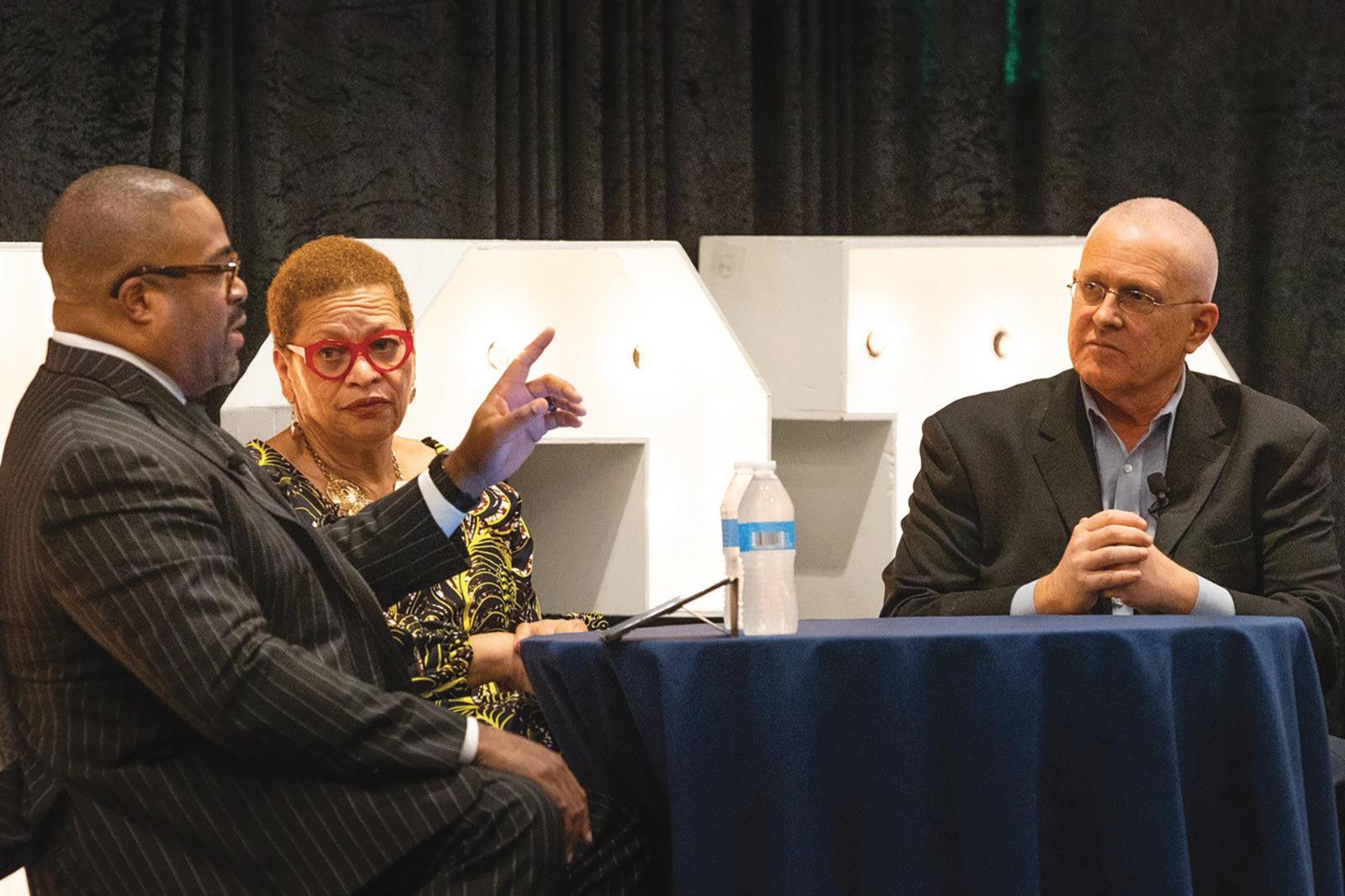
For the last two weeks, the LA city council has been embroiled in a scandal centered around the release of a recorded conversation involving former City Council President, Nury Martinez, and City Councilmembers Kevin de León and Gil Cedillo and former LA County Federation of Labor President Ron Herrera made disparaging comments about several groups including Blacks, Mexicans, LGPTQIA+, as well as several individuals, including Bonin, who is White, and his adopted son Jacob,who is Black.
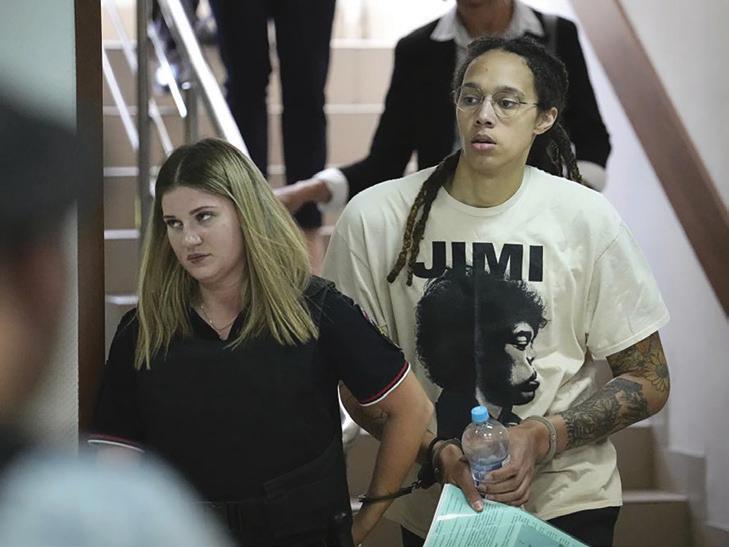
“The attitude that they had of contempt and racism did not surprise me,” Bonin said. “This was about the three of them holding power…They said, because I voted with Marqueece [Harris-Dawson], Curren [Price Jr.] and my
DC Real Estate Firms to Pay $10M for Housing Discrimination
By ASHRAF KHALIL Associated PressWASHINGTON (AP) – A trio of real estate companies will pay $10 million for illegally discriminating against renters using government housing vouchers in the nation’s capital, in what Washington Attorney General Karl Racine said was the largest civil penalty in U.S. history for a housing discrimination case.
``When landlords break the law and refuse to accept vouchers, it’s reminiscent of Jim Crow-era housing discrimination policies intended to restrain opportunities for Black residents,’’ Racine said Thursday in announcing the settlement. ``We’re sending a message to all landlords: If you follow this playbook, you will face consequences.’’
Some company executives also are included in the settlement.
Racine filed a lawsuit in 2020 accusing DARO Management Services, DARO Realty and Infinity Real Estate of violating local civil rights and consumer protection laws by either denying housing to lowincome applicants with housing vouchers or imposing additional and illegal fees and requirements.
The three interconnected companies own and manage units in 15 buildings across Washington. As part of the settlement, the companies have agreed to stop managing residential properties in the city and will hand over management of its properties within 18 months. In addition, DARO Management President Carissa Barry will relinquish her local real estate license for 15 years.
A phone call to DARO Management seeking comment on the settlement did not receive an immediate response.
Racine said his investigation uncovered “mountains of evidence,’’ including multiple emails between company executives indicating a clear intent to block prospective renters using vouchers from the city’s Housing Choice Voucher Program, generally known as Section 8. About 95% of Section 8 voucher holders in D.C. are Black, Racine said.
Under terms of the district’s limited status as a non-state, Racine’s office does not have authority to prosecute felonies or several categories of serious misdemeanor crimes. Those cases are handled by the U.S. Attorney’s Office. However, Racine was able to file suit against DARO and its related companies as a violation of Washington’s consumer protection laws and Human Rights Act, which prohibits income-based housing discrimination.
“Vouchers are a critical tool that help our vulnerable residents,” Racine said. “Too many residents, especially people of color, face serious obstacles in finding safe and affordable housing. This displacement is not just the result of market forces. Instead it’s often caused ... by a deliberate, illegal and unethical business model.’’
Oprah Lends Her Appeal to Abrams in Georgia Election
By JEFF AMY Associated PressATLANTA (AP) – Oprah Winfrey is again shining her star power on Democrat Stacey Abrams’s bid for governor in Georgia, as Abrams pursues a rematch against incumbent Republican Brian Kemp, who she narrowly lost to in 2018.
Winfrey appeared in a prerecorded chat with Abrams on a campaign website Thursday, saying she believes the candidate has a ``calling to want people to be able to do better, to live better and to thrive in their lives.’’
``I’m wishing that the people of Georgia come out and make that a reality for you and the state of Georgia,’’ Winfrey said.
The appearance comes during the first of three weeks of early voting in Georgia, as Democrats in particular seek to drive their voters to cast ballots early. More than 434,000 people had already voted as of Thursday morning.
Women
By Megan Sayles, AFRO Business Writer Report for America Corps MemberThe multi-cultural, multi-ethnic Women Elevating Women (WEW) conference, sponsored by JPMorgan Chase, returned to D.C. this past weekend to bring women business owners and executives together to discuss and share strategies for success and economic empowerment.
Launched in 2018, the conference cultivates a community of peer advisors to help more women grow their companies into million-dollar businesses.
“We know that barely 2 to 3 percent of all women have gross revenues of a million dollars, but if you break it out by ethnicity, we are a fraction of a fraction of a fraction,” said Betty Hines, founder and CEO and founder of W.E.W. “Having worked with multi-million and multibillion-dollar companies for over 17 years, I wanted to take my skills and bring them to that underappreciated market of women and give them the tools that they needed to help them scale.”
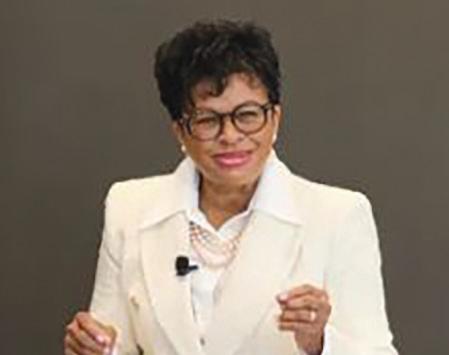
Specifically, Hines wants to help women achieve what she defines as the five pillars of success: courage, communication, collaboration, connection and cultivation. The pillars encourage women to foster robust professional relationships and support systems, hone their business branding, take care of their mental and financial health and give back to others in their communities.
According to Hines, since the COVID-19 pandemic, many women-owned businesses have been forced to close because they did not have the capital to sustain themselves. However, she thinks the biggest challenge facing women entrepreneurs is not just access to capital but also having the financial understanding of what is available to them in terms of financing their businesses.
The theme for this year’s conference was Collaborative Pathways, emphasizing the importance of women business owners sharing their resources to help each other advance faster and further.
Attendance was capped to less than 100 women, so each person had the time to create meaningful, long-
Winfrey visited Georgia in November 2018 to campaign for Abrams in her previous unsuccessful bid, even knocking on some doors in suburban Atlanta. Since then, Abrams has vaulted to her own national fame as a voting rights activist and Democratic leader, earning millions from books and speeches.
Kemp has attacked Abrams as ``Celebrity Stacey,`` saying last month that Abrams is ``running her campaign to cater to liberal elites’’ and not to Georgians. Kemp generally leads Abrams in polls.
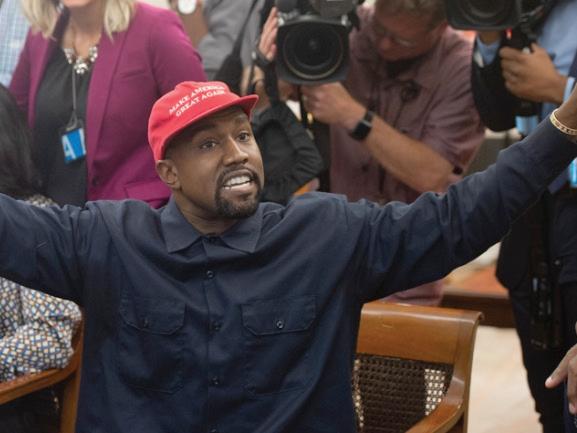
``While Stacey Abrams continues to solicit the help of out-of-state billionaires,’’ said Kemp spokesperson Tate Mitchell, ``Gov. Kemp will continue to talk to hardworking Georgians about his record of economic success and plan to build a safer, stronger Georgia.’’
Abrams used the Thursday event to share her platform, which includes expanding Medicaid health insurance, raising teacher pay, improving affordable housing, and developing small businesses, especially ones owned by nonwhite residents.
``As the governor, my mission is to make sure that everyone can can do well that they have education, health care and housing and the ability to make a good living and take care of themselves,’’ Abrams said.
She also argued that people should vote for her as protection against U.S. Supreme Court decisions that might erode minority voting rights, protections for LGBTQ people, and safeguards against stolen presidential elections.
``And so if you want opportunity, freedom, and the ability to control your future, you need me as governor, because Brian Kemp’s proven he doesn’t care and he won’t help,’’ Abrams said.
``That is a lot on the line,`` Winfrey said. ``That’s enough to get rid of your lethargy and get you up and out.’’

Russian Court Upholds BrittneyGriner Conviction
By Stacy M. Brown NNPA Newswire Senior National CorrespondentWNBA Star Brittney Griner will remain in a Russian prison and serve the bulk of her 9-year sentence following the Moscow Regional Court’s decision on Tuesday to uphold her earlier conviction and sentence. The court slightly reduced the sentence by granting Griner 1.5 days of time served. The Phoenix Mercury all-star has been in custody since Feb. 17. Tuesday’s outcome only hastened fears that Griner would now be sent to one of Russia’s brutal prison colonies, where abuse and even torture reportedly occurs routinely. “We are aware of the news out of Russia that Brittney Griner will continue to be wrongfully detained under intolerable circumstances after having to undergo another sham judicial proceeding today,” U.S. National Security Adviser Jake Sullivan Sullivan told reporters. “President Biden has been very clear that Brittney should be released immediately.” According to CNN, Sullivan stressed that the Biden administration is working to get Griner, and Paul Whelan released. Sullivan said the administration “remains in contact with representatives of the families.” Whelan, an ex-Marine, has been detained since 2018. “In recent weeks, the
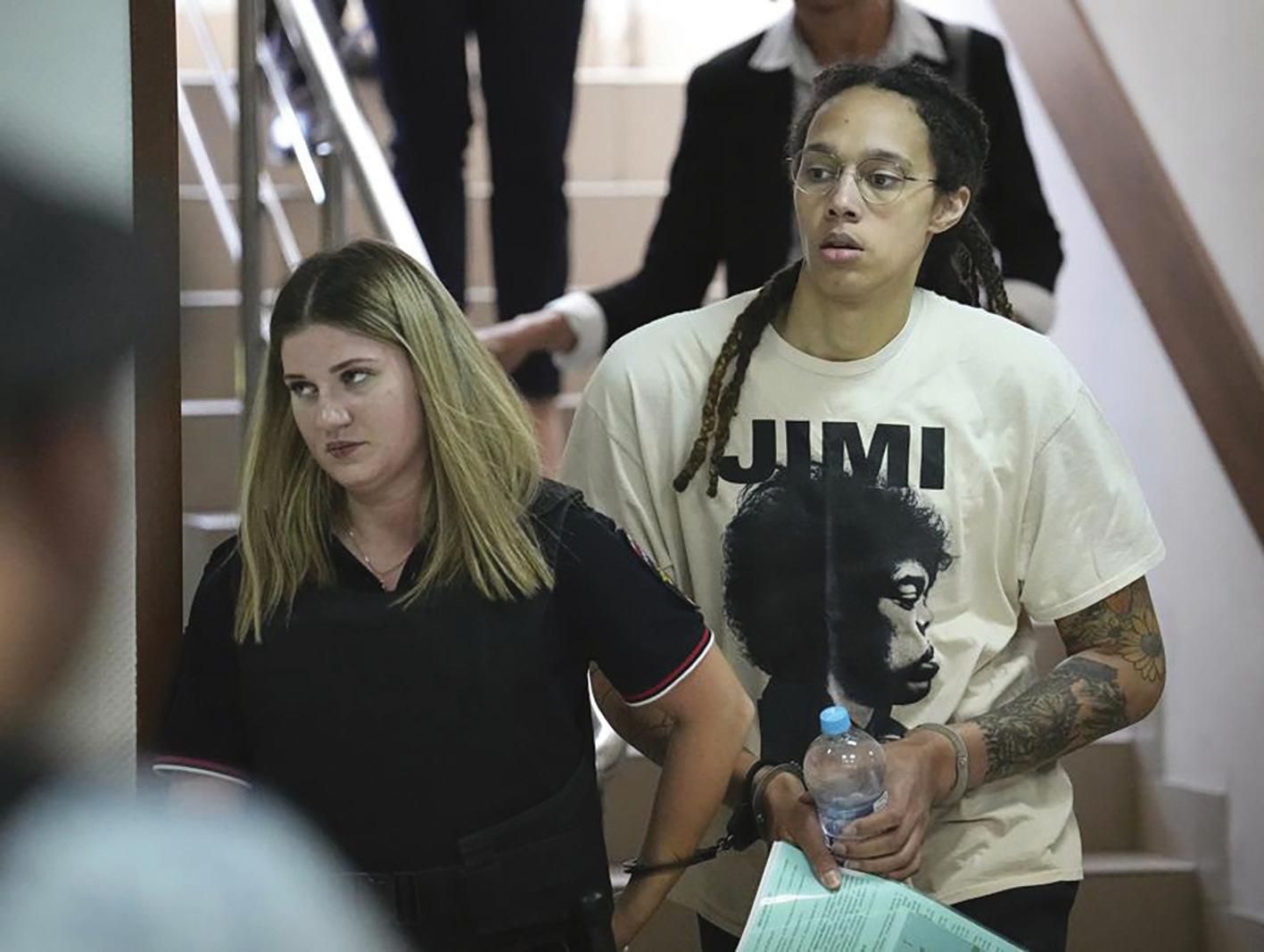
Biden-Harris Administration has continued to engage with Russia through every available channel and make every effort to bring home Brittney as well as to support and advocate for other Americans detained in Russia, including fellow wrongful detainee Paul Whelan,” Sullivan said. “The President has demonstrated that he is willing to go to extraordinary lengths and make tough decisions to bring Americans home, as his Administration has done successfully from countries around the world.” Biden has offered Russian Viktor Bout, a notorious arms dealer, in exchange for Griner and Whelan but thus far hasn’t been able to strike a deal with Moscow. “We are very disappointed. The verdict contains numerous defects, and we hoped that the court of appeal would take them into consideration,” Griner’s lawyers Maria Blagovolina and Alexander Boykov said in a statement. “We still think the punishment is excessive and contradicts to the existing court practice.” “Brittney’s biggest fear is that she is not exchanged and will have to serve the whole sentence in Russia. She had hopes for today as each month, each day away from her family and friends matters to her,” her lawyers noted.
Millions of Voters Are Disenfranchised Ahead of Midterm Elections
By Stacy M. Brown NNPA Newswire Senior National CorrespondentWith the midterm election just days away, the District of Columbia-based think tank, The Sentencing Project, has released a new report which found that 4.6 million people can’t vote because of felony convictions. Researchers pointed out that the number amounts to one in every 50 adults, with three out of four disenfranchised living in their communities, having completed their sentences or remaining supervised while on probation or parole. “While
many states have taken steps to expand the right to vote to people with felony convictions, this report makes it clear that millions of our citizens will remain voiceless in the upcoming midterms,” Amy Fettig, Executive Director of The Sentencing Project, said in a news release. “Felony disenfranchisement is just the latest in a long line of attempts to restrict ballot access, just like poll taxes, literacy tests, and property requirements were used in the past. It is time for our country to guarantee the right to vote for people with felony convictions.” The report, “Locked Out 2022,” updates and expands upon 20 years of work chronicling the scope and distribution of felony disenfranchisement in the United States. Researchers found that in three states – Alabama, Mississippi, and Tennessee – more than 8 percent of the adult population, one of every 13 adults, is disenfranchised. Additionally, Florida remains the nation’s
disenfranchisement leader in absolute numbers, with over 1.1 million people currently banned from voting, often because they cannot afford to pay court-ordered monetary sanctions. The Sentencing Project found an estimated 934,500 Floridians who have completed their sentences remain disenfranchised, despite a 2018 ballot referendum that promised to restore their voting rights. Further, one in 19 African Americans of voting age is disenfranchised,a rate 3.5 times that of non-African Americans. Among the adult African American population, states have disenfranchised 5.3 percent, compared to 1.5 percent of the adult non-African American population, researchers reported. Also, more than one in 10 African American adults have fell victim to disenfranchisement in eight states – Alabama, Arizona, Florida, Kentucky, Mississippi, South Dakota, Tennessee, and Virginia. The researchers
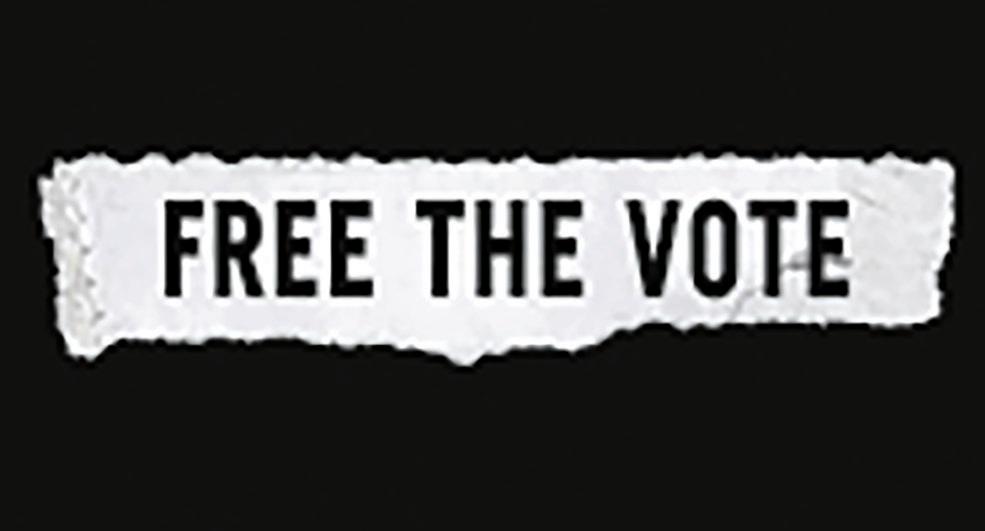
noted that data on ethnicity in correctional populations are unevenly reported and undercounted in some states. Still, a conservative estimate is that at least 506,000 Latinx Americans, or 1.7 percent of the voting-eligible population, are disenfranchised. Approximately 1 million women are disenfranchised, comprising over one-fifth of the total disenfranchised population. “Despite state-level reforms and the hard work of voting rights advocates, millions of Americans remain disenfranchised, representing 2% of the voting-eligible population,” said Christopher Uggen, the report’s co-author. “In this election year, the question of specific voting restrictions, the broader issue of voter suppression, and the disproportionate impact on marginalized communities should be front and center on the public agenda.”
NAACP Convention Addresses Racial Scandal Consuming LA
other colleagues, I was the fourth Black member… They went after the organization that Karen Bass founded, The Community Coalition, which is based on a Black-Brown coalition. They went after KIWA, the Korean Immigrant Worker Association, which is based on multiracial collaboration. They were against the idea of people working together, their whole thing was about divide. Their whole thing was for them to win. Somebodyelse had to lose.”
Martinez and Herrera resigned within days after the meeting tape was leaked, but despite public outrage and pressure from across the political spectrum, including Pres. Joe Biden, Cedillo and De León are refusing to step down.
“One of the things that I think we should be actually calling for is the official censure of these offending council members, and we need to take away their pay,” said Callender. “If they want to sit there, if they want to do something, they should do it without receiving any money… They refused to resign, refused to pay them… They took Mark Ridley-Thomas’ pay the exact same way.”
“We’re literally looking at every possible thing,” saidBonin. “There is no one on the council who wants them there.”
The President awards dinner honored the activism and achievements of high preforming members andNAACP branches. Honorees included D’Adrea Davie of Stockton, a real estate agent and advocate for building generational wealth, and Yusef Miller of San Diego, a
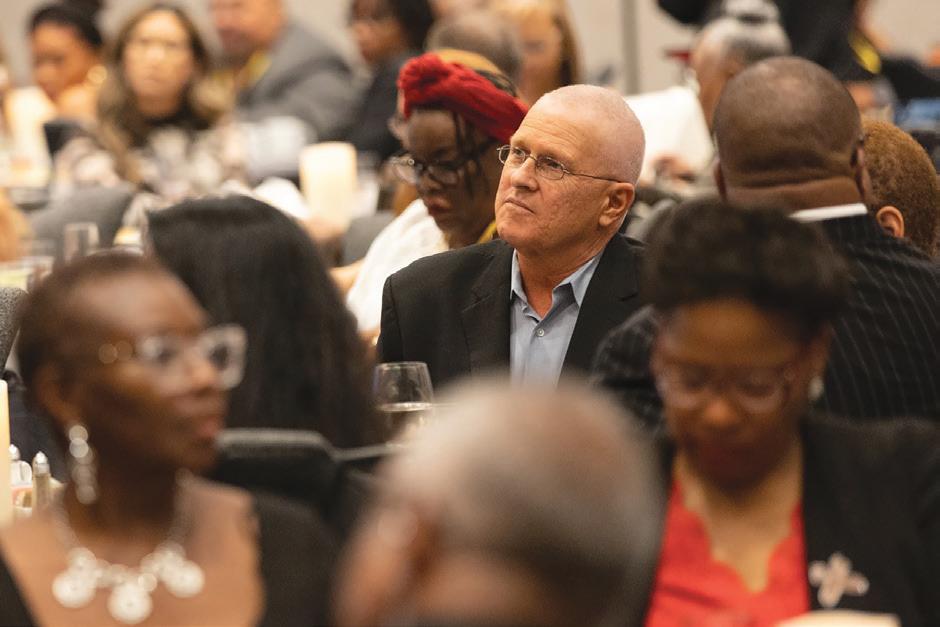
Civil rights attorney Ben Crump gave the keynote address at a youth-focused dinner Friday night. Crump has a national reputation as an advocate for social justice and is known for his representation of clients like the families of Ahmaud Arbery, Breonna Taylor, George Floyd, Jacob Blake, and Daunte Wright. The Rev. Al Sharpton calls him “Black America’s Attorney General.”
The NAACP was founded in 1909 in response to the ongoing violence against Black people around the country. The NAACP is the largest and most pre-eminent civil rights organization in the nation. There are over 2,200 units andbranches across the nation with over 2 million activists. Its mission is to secure the political, educational, social, and economic equality of rights in order to eliminate racebased discrimination and ensure the health and well-being of all persons.
More information about the NAACP California State Conference is available at www.CAHINAACP.org.
Credo
The
Publisher and Editors. All rights are reserved on materials accepted for publication unless otherwise specified.
The Observer Group Newspapers of Southern California, Inc.: Los Angeles News Observer, Bakersfield News Observer, The Valley’s News Observer
Angeles News Observer
Women Elevating Women
lasting connections with their fellow entrepreneurs and executives, as well as discuss their needs to grow and scale their businesses.
Carolyn Howell, CEO of the corporate event planning company, Events USA, attended the conference as a guest speaker, and she was also the emcee.
She wanted to help other women business owners avoid making the same mistakes she made while growing
her company, and she reminded attendees about the importance of having a business plan, mission and vision, as well as the value of finding knowledgeable mentors.
“I wanted to draw other people’s attention to the value of an organization that provides a community of peer advisors, not to tell you what to do, but so that you can share goals, challenges, ideas, opportunities and strategies,” said Howell. “You need the tips, the tools, the techniques
to be effective, and Women Elevating Women gives you all that and then some.”
The post Women Elevating Women conference provides support to women looking to successfully grow and scale businesses appeared first on AFRO American Newspapers.
Attorney Ben Crump Files Lawsuit on Behalf of
User of Chemical Hair Straightening Products
years
study
more
were more than twice
uterine cancer than those who didn’t use those
likely
Institute of Health’s National Institute of Environmental Health Sciences conducted the study. Uterine cancer rates and deaths are reportedly on the rise in the U.S. Death rates are highest among non-Hispanic Black women, who are more
likely than other populations to be afflicted with aggressive subtypes of uterine cancer, according to the National Institutes of Health, which tracked data from 34,000 women in the Sister Study for more than a decade. “Black women have long been the victims of dangerous products specifically marketed to them,” said Crump. “Black hair has been and always will be beautiful, but Black women have been told they have to use these products to meet society’s standards. Unfortunately, we will likely discover that Ms. Mitchell’s tragic case is one of the countless cases in which companies aggressively misled black women to increase their profits.” Chemical hair straighteners typically contain
products associated with higher cancer risk, including formaldehyde, metals, phthalates, and parabens, which may be more easily absorbed by the body through scalp burns and abrasions often caused by chemical straighteners, studyauthors determined.
Zimmermann added that companies like L’ Oréal “targeted Black and Latin women for their own profit motive and without regard to the serious health risks that these hair-straightening products cause is a serious wrong that needs to be corrected.” “We have commenced this important litigation to seek and obtain justice for thosewomen and their families.”
Cardi B Absolved in Racy Mixtape Artwork Lawsuit
By JONATHAN LANDRUM Jr. AP Entertainment WriterSANTA ANA, Calif. (AP) – A jury sided with Cardi B on Friday in a copyright infringement case involving a man who claimed the Grammy-winning rapper misused his back tattoos for her sexually suggestive 2016 mixtape cover art.
The federal jury in Southern California ruled Kevin Michael Brophy did not prove Cardi B misappropriated his likeness. After the jury forewoman read the verdict, the rapper hugged her attorneys and appeared joyful.
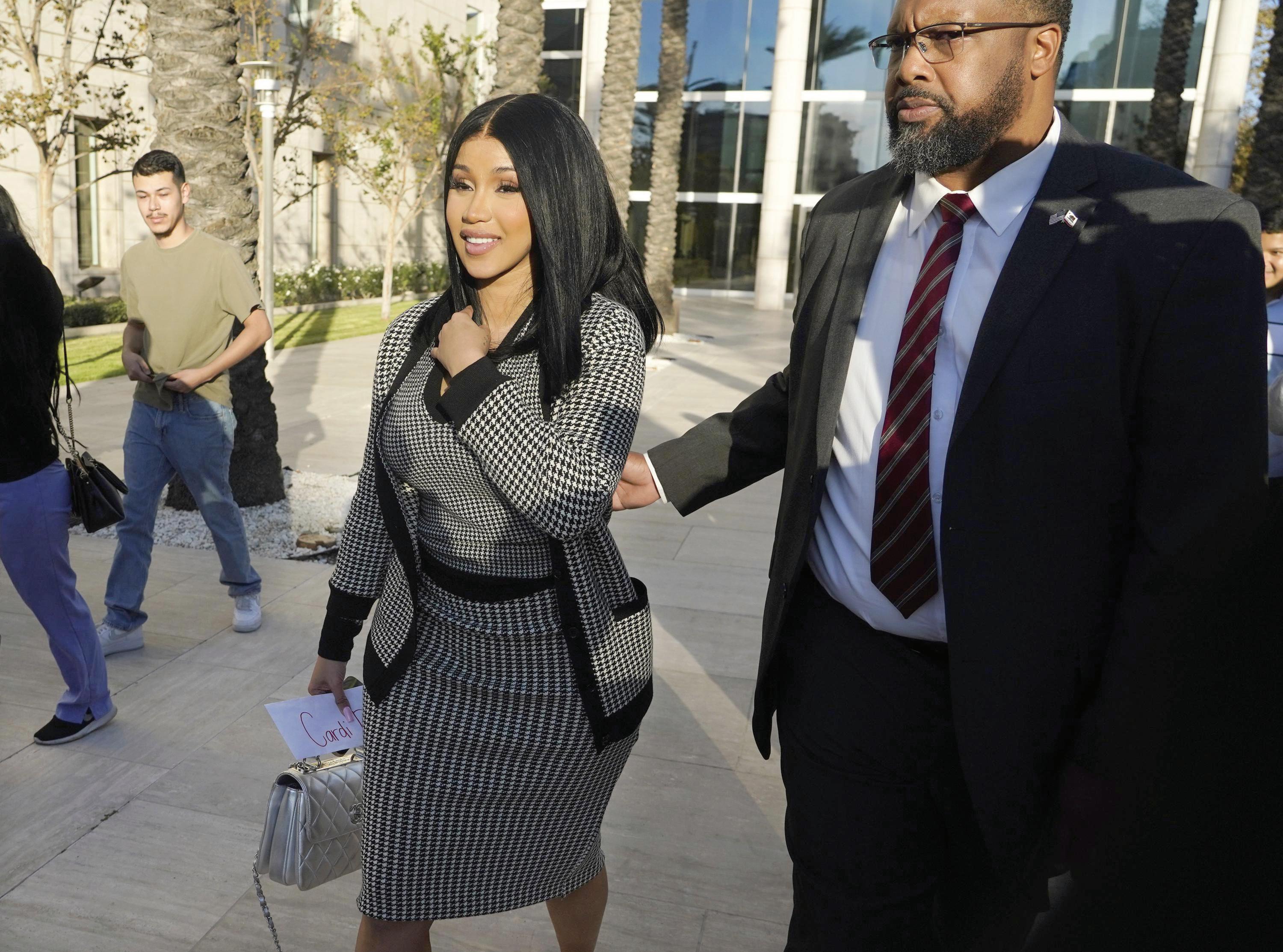
Cardi B thanked the jurors, admitting she was ``pretty nervous'' before hearing the verdict.
``I wasn't sure if I was going to lose or not,'' she said after leaving the courthouse. She was swarmed by several reporters, photographers and more than 40 high schoolers who chanted her name. One fan held up a sign asking if she could take him to his homecoming dance, to which she replied ``Yes, I'll see what I can do.''
``I told myself if I win, I was going to cuss Mr. Brophy out. But I don't have it in my heart to cuss him out,'' she said. In the courtroom, Cardi B had a brief, cordial conversation with Brophy and shook his hand.
Brophy filed the lawsuit a year after the rapper's 2016 mixtape was released. He called himself a ``family man with minor children'' and said he was caused `` distress and humiliation '' by the artwork - which showed a tattooed man from behind with his head between the rapper's legs inside a limousine. The man's face cannot be seen.
``At the end of the day, I do respect you as an artist,'' Brophy said to Cardi B.
Brophy's lawyer, A. Barry Cappello, said photoediting software was used to put the back tattoo, which has appeared in tattoo magazines, onto the male model featured on the mixtape cover.
But Cardi B, whose real name is Belcalis Almanzar, disputed the allegations during her testimony earlier in the week _ and had such an intense exchange with Cappello that the trial was briefly halted by U.S. District Judge Cormac Carney.
Cardi B said she felt Brophy hadn't suffered any consequences as a result of the artwork. She said Brophy has harassed her legally for five year - and even at one point said she missed the ``first step'' of her youngest child because of the trial.
Cardi B delivered pointed answers to several of Cappello's questions. The lawyer once asked her to calm down, but she sharply pushed back at his contention that she knew about the altered image.
Their heated exchange prompted the judge to send jurors out of the Santa Ana, California, courtroom and told both sides that he was considering a mistrial. After a short break, he called the arguing ``unprofessional'' and ``not productive'' but allowed questioning to resume, then placed new restrictions for both sides.
Cardi B said an artist used only a ``small portion'' of the tattoos without her knowledge. She had previously said the cover art - created by Timm Gooden - was transformative fair use of Brophy's likeness.
Cappello said Gooden was paid $50 to create a design, but was told to find another tattoo after he turned in an initial draft. He said Gooden googled ``back tattoos'' before he found an image and pasted it on the cover.
Cardi B's lawyer, Peter Anderson, said Brophy and the mixtape image are unrelated, noting the model did not have neck tattoos - which Brophy does.
``It's not your client's back,'' Cardi B said about the image, which featured a Black model. Brophy is white. The rapper pointed out that she posted a photo of the ``famous
Canadian model'' on her social media.
``It's not him,'' she continued. ``To me, it doesn't look like his back at all. The tattoo was modified, which is protected by the First Amendment.''
Cardi B said the image hasn't hindered Brophy's employment with a popular surf and skate apparel brand or his ability to travel the world for opportunities.
``He hasn't gotten fired from his job,'' said the rapper, who implied that the mixtape was not a lucrative one for her. ``He hasn't gotten a divorce. How has he suffered?
He's still in a surf shop at this job. Please tell me how he's suffered.''
Last month, Cardi B pleaded guilty to a criminal case stemming from a pair of brawls at New York City strip clubs that required her to perform 15 days of community service. Earlier this year, the rapper was awarded $1.25 million in a defamation lawsuit against a celebrity news blogger who posted videos falsely stating she used cocaine, had contracted herpes and engaged in prostitution.
Kanye West to Buy Conservative Social Media Platform Parler
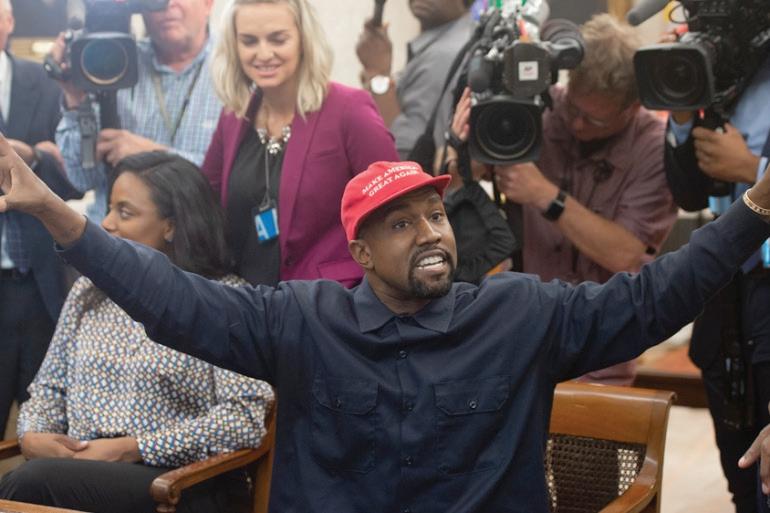 By MICHELLE CHAPMAN and BARBARA ORTUTAY AP Business Writers
By MICHELLE CHAPMAN and BARBARA ORTUTAY AP Business Writers
The rapper formerly known as Kanye West is offering to buy right-wing friendly social network Parler shortly after getting locked out of Twitter and Instagram for antisemitic posts.
The acquisition of Parler would give West, legally known as Ye, control of a social media platform and a new outlet for his opinions with no gatekeeper. The question is, who will listen?
Even among the new breed of largely right-wing, farright and libertarian social apps that purport to support
free speech by having looser rules and moderation, Parler's user base is tiny _ and with competition only increasing for the relatively small swath of mostly older people who want to discuss politics online, there is no clear roadmap to growing it beyond a niche platform chasing crumbs left by mainstream social media.
If Tesla CEO Elon Musk goes through with his planned purchase of Twitter, things may get even more complicated for Parler. That's because Musk has already made it clear he would like to loosen Twitter's rules and contentmoderation efforts, including reinstating the account of former President Donald Trump. If the libertarian and
far-right users who left Twitter _ either because they felt it was constricting to their political views or because they were kicked off _ return, sites like Parler, Gab and Trump's Truth Social could end up losing users.
Parlement Technologies, which owns Parler, and West said Monday the acquisition should be completed in the fourth quarter, but the price and other details were not disclosed. Parlement Technologies said the agreement includes the use of private cloud services via Parlement's private cloud and data center infrastructure.
Parler restructured its business last month to form Parlement Technologies, which it said aims to become the ``world's premier free speech technology infrastructure and platform.`` This means that rather than running a single platform such as Parler, the company wants to provide services to other niche sites that are often deemed too extreme for mainstream tech companies to support. A Parlement spokesperson said the deal with West was not yet in the works when the company was restructured and the two transactions are separate.
Ye was blocked from posting on Twitter and Instagram a week ago over antisemitic posts that the social networks said violated their policies. In one post on Twitter, Ye said he would soon go ``death con 3 on JEWISH PEOPLE,'' according to internet archive records, making an apparent reference to the U.S. defense readiness condition scale known as DEFCON.
Ye has also suggested slavery was a choice and called the COVID-19 vaccine the ``mark of the beast.'' Earlier this month, he was criticized for wearing a ``White Lives Matter'' T-shirt to his collection at Paris Fashion Week.
``In a world where conservative opinions are considered to be controversial we have to make sure we have the right to freely express ourselves,'' Ye said in a prepared statement.
Parler has struggled amid competition from other conservative-friendly platforms like Truth Social, which are tiny as well compared with mainstream social media sites. Parler had an average of 725,000 monthly active users in
the U.S. for the first half of this year, according to Data. ai, which tracks mobile app usage. That's down from 5.2 million in the first half of 2021. Overall, including people outside the U.S., Parler still failed to reach the 1 million mark in the first half of this year.
Truth Social, meanwhile, had 2.4 million monthly users during the same period, despite launching just in February and only on Apple devices, according to Data. ai. The market research firm said another right-leaning platform, Gettr, which launched in July 2021, is ahead of both Parler and Truth Social with about 3.8 million monthly active users.
None of them come close to Twitter, which reported that it had a daily average of about 237.8 million active users during its most recent quarter. Many of the rightwing platforms emerged from opposition to the contentmoderation restrictions at mainstream services such as Twitter and Facebook, but they have failed to attract users in large numbers.
Part of that reason may be that most people don't actually want to discuss politics online. According to the Pew Research Center, one-third of tweets sent in the U.S. are political in nature, but these are mainly sent my a small subset of mostly older people. While Americans ages 50 and older make up 24% of the U.S. adult Twitter population, they produce nearly 80% of all political tweets, according to Pew. This is the audience Ye's Parler would have to be courting if the rapper is serious about growing Parler's user base.
Parler launched in August 2018 but it didn't start picking up steam until 2020. It was kicked offline in January 2021 over its ties to the deadly insurrection at the U.S. Capitol earlier that month. A month after the attack, Parler announced a relaunch. It returned to Google Play last month.
``This deal will change the world, and change the way the world thinks about free speech,`` Parlement Technologies CEO George Farmer said in a prepared statement.
First Black American Board Foundation Member Shares His Perspective
By Stacy M. BrownOtis Rolley possessed a desire to drive positive change in local communities, a craving that led him to Wells Fargo, where he would lead social impact at the banking giant. He said he approached the interview process with Wells’ CEO Charlie Scharf as a two-way conversation. “There is a saying, do not talk about it, be about it,” said Rolley, now the head of Philanthropy and Community Impact at the bank and president of the Wells Fargo Foundation. Rolley also counts as the first Black American elected to his position permanently by the Wells Fargo Foundation board, overseeing about $300 million in philanthropy, employee volunteerism and giving, and the company’s strategic vision on advancing social impact. “I felt that CEO Charlie Scharf was being about it in a real and systemic way and that there was values alignment between myself and the company,” Rolley stated. “The company knows it has more work to do. Changes aren’t going to happen overnight, but they can’t happen at all without dedicated human and financial resources and a commitment from the top.” In a Q&A, Rolley said he believes change is happening and wanted to be on the journey with Wells Fargo.
Q- How did you become interested in taking on societal challenges? Rolley: I was born and raised in Jersey City, NJ, a complex city in its own right but also close to New York City and Newark. So very early on, I had a front row seat to city life with all of its challenges and opportunities. This urban upbringing stayed with me and ultimately informed my career path. An urban planner by training, I am fascinated by the obstacles and barriers each community faces when it comes to equitable access to economic opportunity and how to remove them. I felt a need to take what I had seen and lived, and then learned in college, and put it into practice every day.
Q-What has been your career journey so far? Rolley: I started my career with increasingly demanding roles in municipal government in Baltimore, advocating for better housing, small business and infrastructure across five
administrations. My journey eventually took me to the private sector where I joined the Rockefeller Foundation leading the North America team of the 100 Resilient Cities Initiative and then the U.S. Economic Equity and Opportunity Initiative. My focus was public-private partnership nationwide and long-term investments for low wage workers and communities of color across the country. I’ve also held other positions across the public and private sectors so I understand how both need to work together to tackle difficult societal issues.
Q-Why did you choose to join Wells Fargo? Rolley: I want to drive positive change in local communities. I’ve been focused on that my entire career. Leading social impact at Wells Fargo is an opportunity to take my experience and vision and put it to work on a larger scale with more resources. I honestly approached the interview process as a two-way conversation. There is a saying, do not talk about it, be about it. I felt that CEO Charlie Scharf was being about it in a real and systemic way and that there was values alignment between myself and the company. The company knows it has more work to do. Changes aren’t going to happen overnight, but they can’t happen at all withoutdedicated human and financial resources and a commitment from the top. The head of diversity, equity and inclusion, at Wells Fargo is a Senior Executive Vice President for Diverse Segments, Representation and Inclusion. They are a member of the Operating Committee, have a real budget, real staff, real integration with lines of business and corporate giving. There are internal diverse affinity groups and strategic efforts underway with employees and policies, as well as external work. I believe change is happening and wanted to be on the journey with Wells Fargo.
Q-What is your vision for advancing Wells Fargo’s commitments to the Black community? Rolley: I believe everything moves at the speed of trust. We have to learn from our past, not get lost in it. And if we fail again, we have to fail fast, learn fast and fix fast. We also have an opportunity to better communicate, collaborate,
and coordinate across the bank’s efforts to advance a more inclusive economy, and specifically to create more economic success for Black communities. To do this, we have to be intentional with our resources, track and amplify impact with data. I’m encouraged by programs like Wells Fargo’s Open for Business Fund, a roughly $420 million small business recovery effort. Eighty-five percent of small businesses served by Open for Business Fund grantees are Black, African American, Hispanic or other underserved entrepreneurs. Our new $60 million effort called WORTH (Wealth Opportunities Restored Through Home Ownership) has a goal of 40,000 new homeowners of color by 2025. This year, Wells Fargo launched Growing Diverse Housing Developers, a program aimed at providing capital to Black developers who are increasing housing supply. New efforts like the Special Purpose Credit Program to underwrite refinance costs for Black customersand a $2 billion Inclusive Communities and Climate bond are underway. Ensuring these efforts reach deep into the community excites me. There’s opportunity for real progress if we can track meaningful outcomes in peoples’lives.
Q- Do you see racial equity as a standalone strategy or integrated into your work? Rolley: I’ve worn glasses since the third grade. With lenses, you can take them on and off. I believe racial equity and advancing historically marginalized groups can’t be a lens, a criteria on a checklist. Racial equity should be centered in the work we do, and I intend to bring even more of that thinking as I lead at Wells Fargo. There’s no question that we need to advance greater equity in this country. There’s no question that policies and systems in place limit economic mobility for Black Americans, and other communities. We need to not only remove barriers holding people back but bring intentionality and innovation to housing, small business, financial health and building a more inclusive economy. The more of us in roles to effect that type of change, thebetter.
Rolley also counts as the first Black American elected to his position permanently by the Wells Fargo Foundation board, overseeing about $300 million in philanthropy, employee volunteerism and giving, and the company’s strategic vision on advancing social impact.
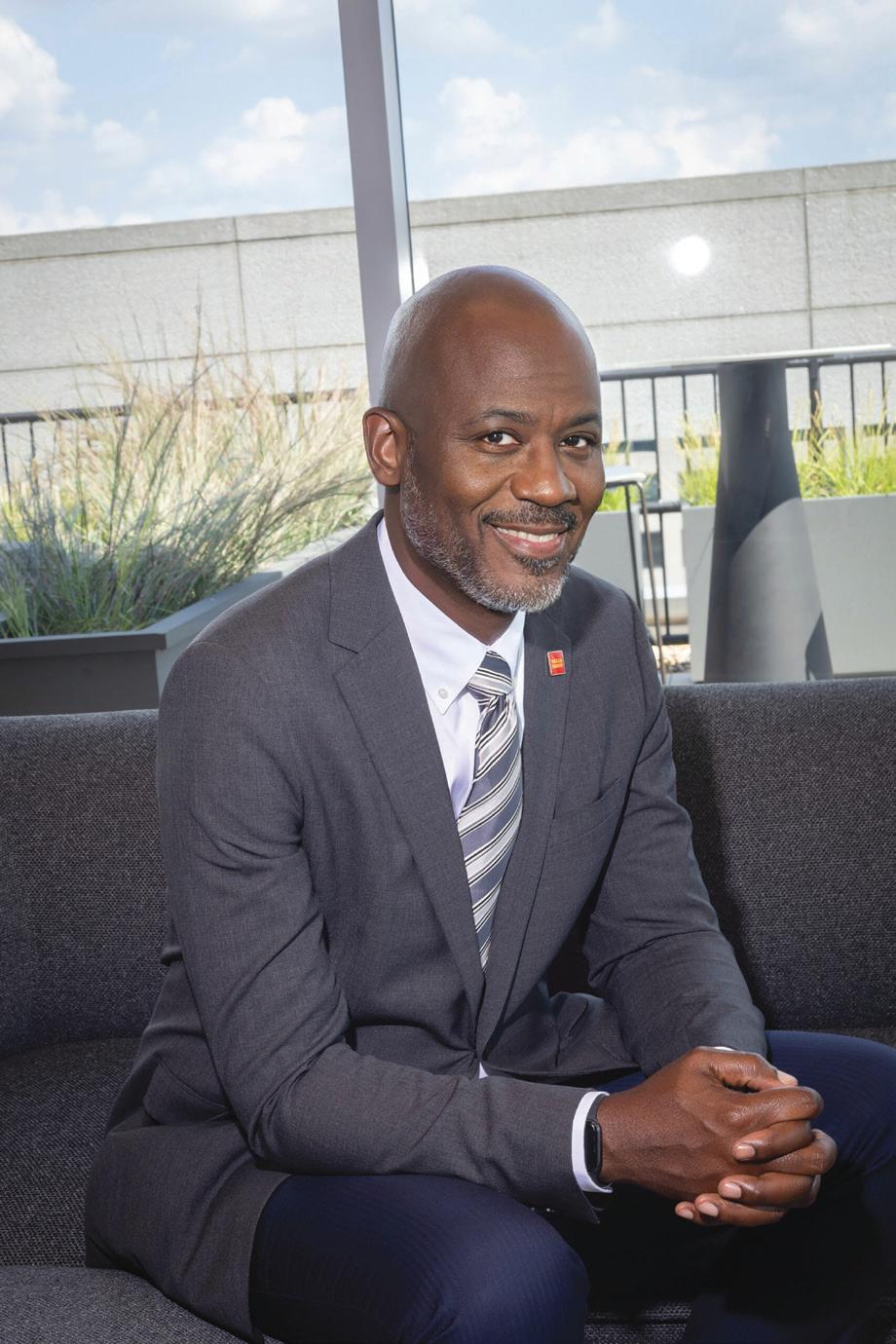
Attorney Files Class Action Suit Against U.S. Gov’t on Behalf of Black Farmers
By Stacy M. BrownNNPA Newswire Senior National Correspondent
America’s “Black Attorney General,” Civil rights attorney Ben Crump on Wednesday, October 12, announced a class action suit against the United States government on behalf of the National Black Farmers
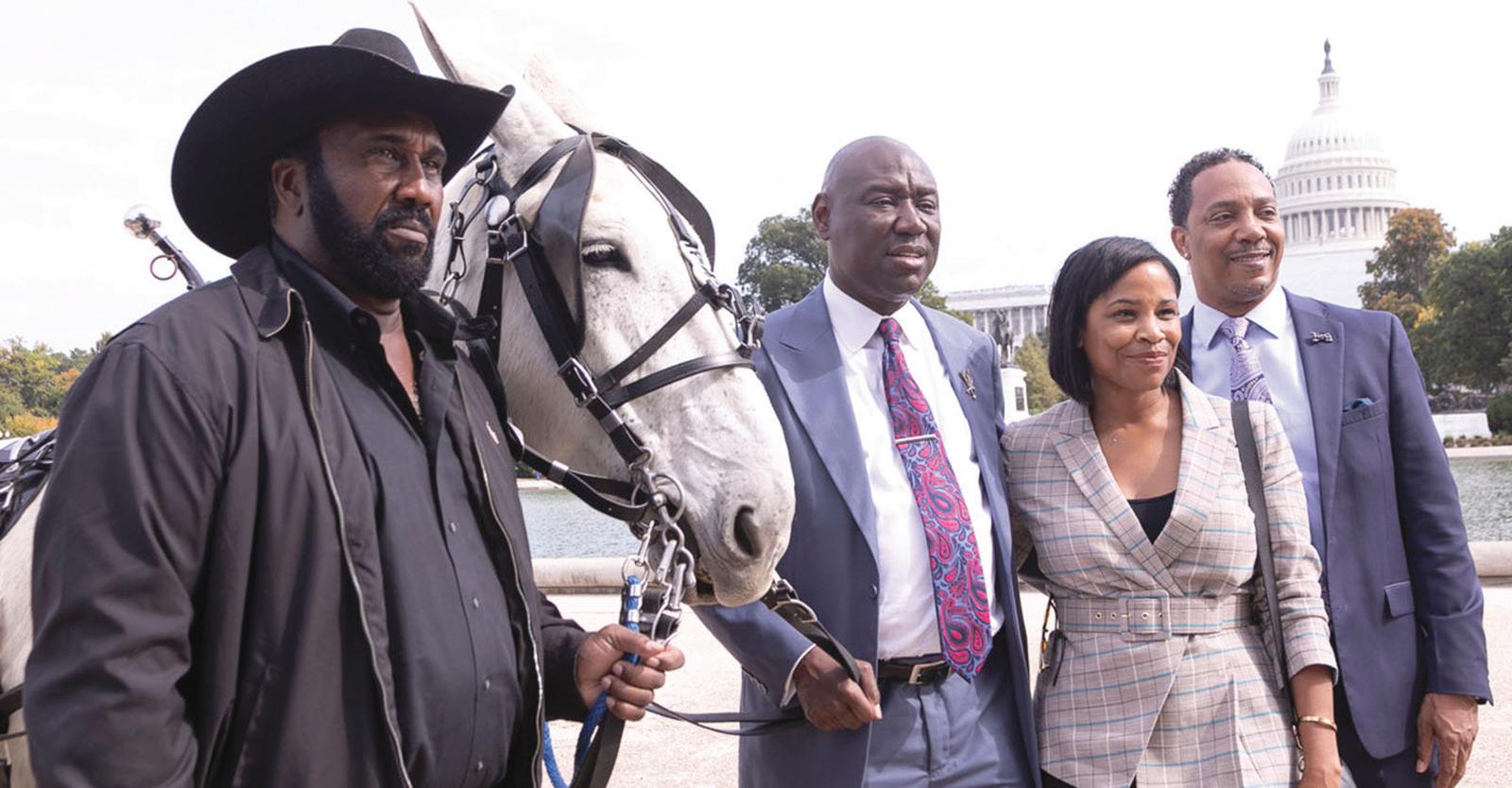
Association.
The lawsuit comes amid findings that Black farmers lost about $326 billion of land in America because of discrimination during the 20th century.
During the announcement of the suit on the National Mall in Washington, Crump and the farmers claimed the
federal government breached its contract with socially disadvantaged farmers under the American Rescue Plan Act.
Farmers contend that the law included provisions to pay off USDA loans held by 15,000 African Americans, Native Americans, Alaskan Natives, Asian Americans, Pacific Islanders, and Hispanics and Latinos in the farming industry.
In August, Congress repealed section 1005 of the American Rescue Plan Act of 2021, which provided funding and authorization for the federal government to pay up to 120 percent of direct and guaranteed loan outstanding balances as of January 1, 2021, for socially disadvantaged farmers and ranchers, breaking the government’s promise and leaving farmers in foreclosure.
Black farmers said they relied on the federal government to keep its promise to fund $5 billion to the farmers when it passed the American Rescue Plan Act.
“Black and other farmers of color did exactly what the government asked them to do. They maintained or expanded their operations to strengthen America’s food supply during the COVID-19 crisis,” Crump asserted.
“They believed the U.S. government’s promises. They took Congress and the Administration at their word, expecting that the government would pay off their debt, as the USDA promised in writing.
“Instead, it was 40 acres and a mule all over again, 150 years later – broken promises that doomed generations of Black farmers to become sharecroppers and robbed Black families of billions in intergenerational wealth.”
With Crump at the helm, Black farmers across the country said they’re prepared to fight for the money promised.
“I’m very disappointed in this legislative action,” said John Wesley Boyd, Jr., founder and president of the National Black Farmer’s Association, a nonprofit representing African American farmers and their families.
“I’m prepared to fight for debt relief for Black, Native American, and other farmers of color all the way to the Supreme Court. I’m not going to stop fighting this.”

A 2019 report highlighted how many federal agencies have systemically discriminated against Black farmers, including the USDA.
“Through discriminatory loan denials and deliberate delays in financial aid, the USDA systematically blocked Black farmers from accessing critical federal funds,” the report authors noted.
“If you are Black and you’re born south of the Mason-Dixon Line, and you tried to farm, you’ve been discriminated against,” Lloyd Wright, the director of the USDA Office of Civil Rights under Bill Clinton and
Barack Obama, and a Black Virginia farmer, said in the report.
The report noted that the debts Black farmers “consequently accrued cost them millions of acres, which white buyers then snapped up.”
In 1920, Black farmers peaked at nearly 1 million, constituting 14 percent of all farmers. But between 1910 and 1997, they lost 90 percent of their property. By contrast, white farmers lost only 2 percent in the same period.
As of 2017, there were just 35,470 Black-owned farms, representing 1.7 percent of all farms.
Black farmers lost some 16 million acres, Conservatively estimated to be worth between $250 billion and $350 billion in current dollars.
Lawrence Lucas, President Emeritus of the USDA Coalition of Minority Employees and representative of the Justice for Black Farmers Group, said USDA Secretary Thomas Vilsack had done nothing to help Black farmers.
“The amount of wealth loss could be in the trillions of dollars,” Lucas remarked. “We’ve had administration after administration, president after president, and Congress after Congress does nothing. Secretary Vilsack was a disaster even when he worked under President Obama, who wasn’t good to us.”
In a letter to the agriculture secretary, Lucas expressed his disappointment.
“We have watched with disbelief and discouragement as a sequence of events played out in a self-fulfilling prophesy: a Vilsack agriculture transition team member declared that what we wanted, debt relief for Black farmers, was unconstitutional,” Lucas wrote.
“We contend that there was an unnecessary length of time spent on Senator Warnock’s two bills, voted into the American Rescue Plan Act of 2021, and the decision by a Florida judge to issue a temporary restraining order against you, which stopped relief for Black farmers.”
“We contend that you slow-walked the processing of these claims with a process that went beyond 100 days. With the stroke of your pen, we are fully aware that you could have removed the debt these farmers have suffered because of USDA’s long history of discrimination, not a process but debt relief.
“Instead, we have white privilege that continues to be a part of the USDA landscape at the pain and suffering of Black farmers and others,” Lucas continued.
“[Former President Donald] Trump paid out $16 billion in allotments to white farmers quickly, and Black farmers received only a small fraction of those funds. Why for them and not us?” he concluded.
Stockton Resident Tied to Serial Killings
Manny Otiko California Black Media
Wesley Brownlee, a Bay Area native, is being held on murder charges by Stockton police. He is a suspect in a string of murders in Stockton and Oakland.
According to news reports, local police have long suspected a serial killer was operating in the area. The serial killer is suspected of being responsible for at least six murders. One of the victims was shot but survived.
Brownlee, who lives in Stockton, has a history of drug arrests. According to juvenile court records, Brownlee lost a brother to gun violence. After this incident, he showed signs of mental and emotional distress.
Acting on a tip, local police and other law enforcement agencies began surveilling Brownlee.
He was arrested while scouting for new victims. When he was taken into custody, Brownlee was dressed in black clothing and was carrying a pistol and a mask.
“Our surveillance team followed this person while he was driving. We watched his patterns and determined early this morning he was on a mission to kill,” said Stockton police Chief Stanley McFadden during a press conference. “He was out hunting.”
California State Attorney General Rob Bonta praised the Stockton Police Department and other law officers for removing a dangerous criminal from the streets.
“I am grateful for the work of the Stockton Police Department and law enforcement agencies who lent their support to this investigation, including the California Department of Justice’s Bureau of Firearms and Bureau of Forensic Services,” Bonta said in a press release.
However, there seems to be no pattern to the murders. Four of the victims were Latino, and one was a White male. The lone survivor was a Black woman. Several victims were homeless.
According to FBI profilers, most serial killers are White males. But a few of them have been African American and people of color.
For example, Los Angeles-based serial killer Richard Ramirez,
known as the “Night Stalker,” was Hispanic, and Lonnie David Franklin Jr., dubbed “the Grim Sleeper,” was African American.
Franklin was responsible for at least 10 murders. He was called the Grim Sleeper because he appeared to go dormant and then become active again at intervals during his killing spree, which lasted three decades.
Franklin mainly targeted women in the South-Central area of Los Angeles. Most of his victims were sex workers. Several local residents complained that police didn’t take the killing seriously. Franklin died in prison.
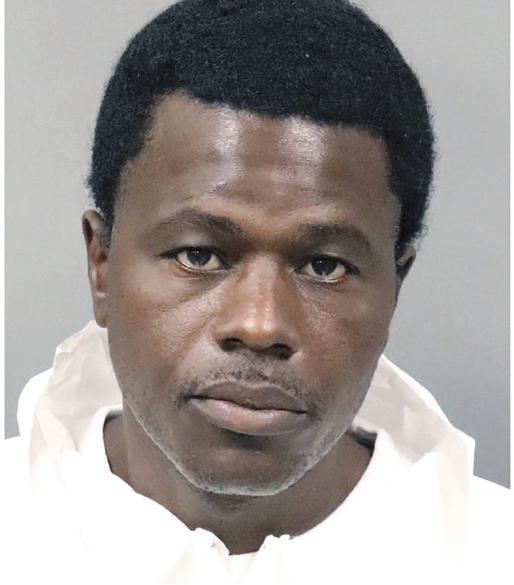
According to FBI records, Samuel Little, an African American, is considered the most prolific serial killer. He claimed responsibility for 93 murders, 50 confirmed by the FBI.
According to police records, Little operated in Los Angeles and parts of Los Angeles County at one point. But before dying in prison in 2020 at the age of 80, prosecutors planned to tie him to murders in at least 14 states. He was serving a life sentence.
Youth Mental Health Care:
California’s First-in-the-Nation Investments May Still Not Be Enough
Aldon Thomas Stiles California Black MediaIn August, The Children’s Partnership hosted a mental health panel centered around the voices of young girls and women of color. The session was organized as part of the organization’s Youth of Color initiative.
“I had never been surrounded by a group of people with the same experiences and the same struggles regarding mental health, regarding being a person of color,” said Samantha Giles.
Giles, a California teenager, is one of the Children’s Partnership’s youth panelists.
“I even got to go into a breakout room where we talked about how our parents don’t necessarily recognize our mental health struggles and I never really talked with someone else my age about my personal experience and their personal experience,” the teenager intimated.
Giles described the interactions she had with her peers as “eye opening.”
That same month, California Gov. Gavin Newsom announced his “Master Plan for Kids’ Mental Health,” an initiative that pumps $4.7 billion into the super-system providing mental health services to the state’s youth.
See the Video: California African American Teens Speak Out
Some advocates and public health officials say the governor’s announcement serves as an appropriate policy response to what experts are calling a mental health crisis in the state. They see it as a positive step the state is taking to address the under-treated and often-overlooked challenges that youth like Giles are trying to overcome.
According to the California Health Care Foundation (CHCF), one in 14 children have experienced a mental or emotional disturbance that disrupts their day-to-day life.
Of the California adolescents who experienced major depressive episodes, 63.6 % did not receive treatment for those incidents.
Newsom touts California’s response to the national mental health crisis over that of other states.
“As other states take away resources to support kids’ mental health, California is doubling down with the most significant overhaul of our mental health system in state history,” Newsom said. “We’re investing billions of dollars to ensure every California child has better access to comprehensive mental health and substance use services.”
Some notable organizations have praised the state’s commitment to children’s and young adults’ mental health.
“The state has made some incredible and historic
investments in children and youth mental health and well-being - both with the $4 billion Children and Youth Behavioral Health Initiative and with the $3 billion Community Schools Initiative,” Angela M. Vázquez, Policy Director at the Children’s Partnership, stated.
However, Vázquez raised concerns about many of these funds being one-time investments that might not fully address the needs of children of color.
Vázquez’s concerns, which mirror those of several mental health advocates in communities of color, extend to Newsom’s pledge to add 40,000 more mental health workers to California.
“Still, the reality is that the clinical workforce is and will likely remain for some time largely White and middleclass - not at all reflective of the diversity of our state’s children,” Vázquez stated.
The Children’s Partnership is currently working on a solution to the existing inequity that the organization says involves peer-to-peer interactions.
“Youth of color from The Children’s Partnership’s own youth policy council, the Hope, Healing, and Health Collective shared that greater investments in peer-to-peer programs would improve the opportunities for youth of color to connect and heal with members of their own communities and identities,” Vázquez stated. “Peer support is an essential evidence-based strategy for young people’s mental health that has the potential to build interest and foundational professional skills that lead to future opportunities for mental health career paths for more students of color.”
Contributing to the state’s youth mental health crisis are other factors like the COVID-19 pandemic, experts say.
According to research published by the Journal of Racial and Ethnic Health Disparities, the state of mental health among Black people worsened during the COVID-19 pandemic with anxiety and depression being the main issues.
“These recent events have layered on additional psychological and emotional stress on children and youth of color, particularly Black youth,” Vázquez stated “In considering what serves young people well, it is imperative that we address the systemic barriers that have contributed to historic mental health disparities in youth, and develop innovative strategies, leaving space for healing outside of and in tandem with the traditional mental health system.”
The CHCF found that Black people had the hardest time amongst all other ethnic groups finding a doctor, especially a specialist.
In 2019, Black children in California were the most likely to experience serious emotional disturbances amongst children of all other racial groups at a rate of nearly 8%.
From 2017 to 2019, roughly 30% of Black 7th graders were projected to have experienced feelings of depression or depressive episodes.
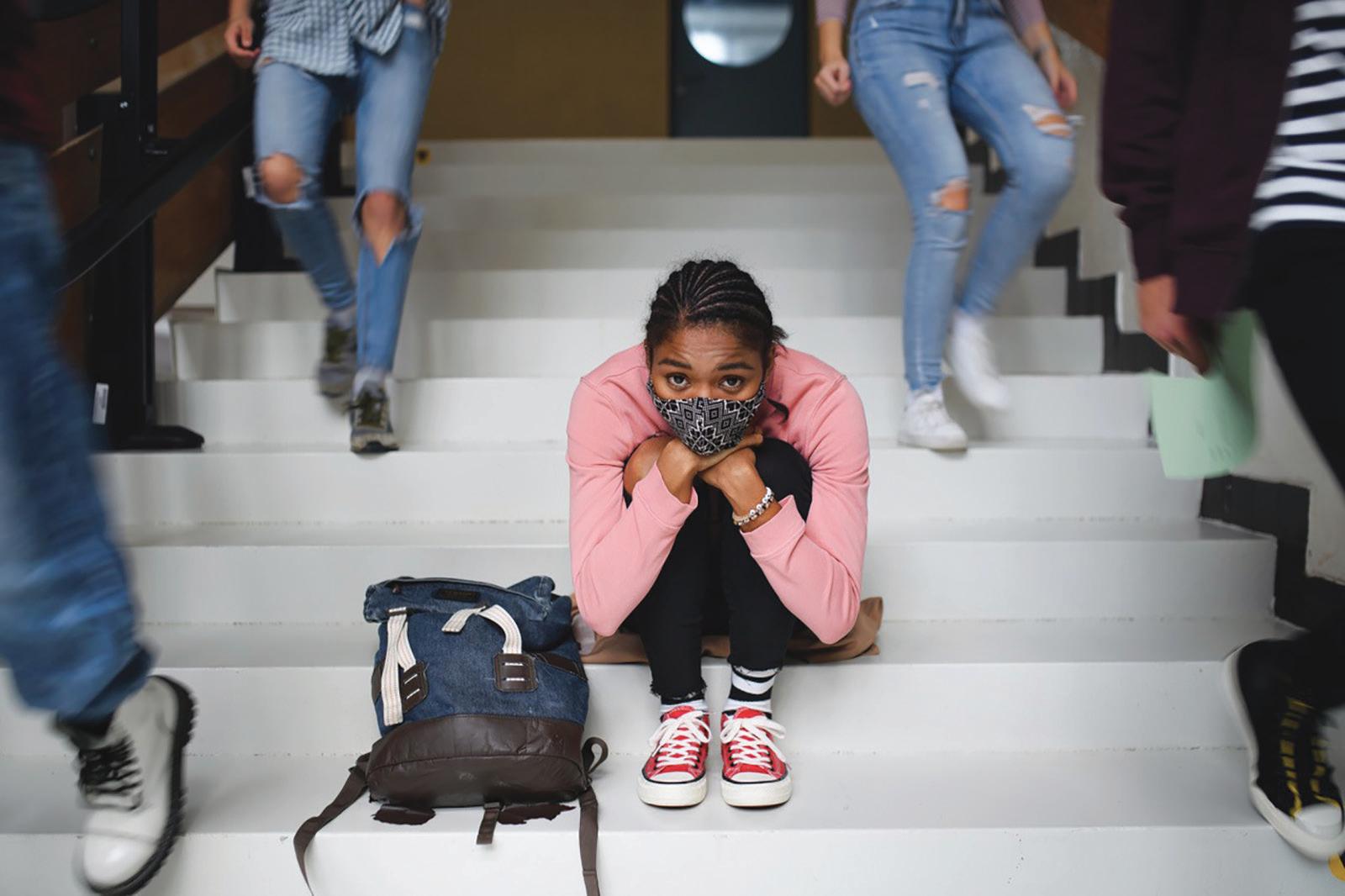
These trends are not just documented among today’s Black children. African American adults are reported to have experienced more adverse childhood experiences that negatively impact their mental health more than any other ethnic group that self-reported, according to the CHCF.
In August, Newsom signed Assembly Bill (AB) 2508, authored by Assemblymember Sharon Quirk-Silva (D-Fullerton). The new state law, Newsom’s office says, reimagines youth mental health services by strengthening care systems in schools and focusing on intervention and prevention instead of crisis care.
The governor says the legislation will “better define the
role of school counselors.”
But Vázquez has some reservations about that bill, too. She feels it does not fully address the mental health needs of all of the state’s children.
“One thing that AB 2508 does not address is the urgent need for greater investments in California’s youngest learners’ mental health - children ages 0-5,” Vázquez stated.
“The state needs to invest significantly more resources in community-based infant and early childhood mental health services, such as early childhood mental health consultations - an evidence-based model that reduces the number of preschool suspensions and expulsions, an issue that has significant disproportionate impacts on young Black children.”
California Black Media’s coverage of Mental Health in California is supported by the California Health Care Foundation.
NY School Added to Dozens Adopting
AP African American Studies Courses
 By Stacy M. Brown NNPA Newswire Senior National Correspondent
By Stacy M. Brown NNPA Newswire Senior National Correspondent
Earlier this year, about five dozen educators attended a four-day seminar at Howard University to discuss course concepts and best teaching practices. During the summit,Howard officials maintained their desire to attract Black and Latinx high school teachers to an Advanced Placement Summer Institute that would help increase diversity amongA.P. teachers. And, with school districts around the nation under heavy scrutiny with laws prohibiting teaching students about Black history, or anything that purportedly would make conservative white America uncomfortable, some have refused to relent.
Now, 60 schools around the country have agreed to participate in a pilot program for A.P. African AmericanStudies. On Monday, October 24, the Brooklyn Preparatory High School in New York announced it had joined the fray. With a large Black and Hispanic student body, Brooklyn Prep will teach an A.P. African American History course. “A lot of our history classes, we learn about white history like Europeans, like colonization, and a lot of things like that,” 17-year-old Amirah Riddick, one of the students who advocated for the course at Brooklyn Prep, told NBC News in New York.
“It’s a game changer, and I feel like us being mostly Hispanic, mostly African American students, mostly Caribbean students, we don’t get to learn much about our cultures and how we were thriving. We learn more about how we were confined like in slavery and how we were treated.” According to the College Board’s Restated and Amended Bylaws, the A.P. African American History course would provide an understanding
of the African experience throughout history with a general overview of centers of African Civilization from antiquity through contemporary times. The course will cover African civilizations such as ancient Kemet (Egypt), Nubia, Axum, Ghana, Mali, Songhai, Kilwa, Sofola, Malinda, Monomotapa, and others. “The course will also provide introductory knowledge of the fundamental cultural commonalities that African peoples share in the midst of linguistic and other kinds of diversity,” the guidelines state. “The course will also examine the influence that African Civilization has exerted on other cultures and the impact of cross-cultural contacts on the African experience.”
Further, the course would consist of an introduction to African American history comprised of units that span the 16th century to the present day. The course guidelines state that students will learn the vast history that begins with the rich legacy of African Kingdoms, the Atlantic Slave Trade, resistance, and triumph in America, to the onward movement of resilience in today’s Civil Rights era. According to Smithsonian Magazine, the A.P. program, which the College Board oversees, allows high school students to take college-level classes, which could count for credit at higher education institutions. Around 70 percent of high schools in the United States offer atleast one A.P. course. “A.P. African American Studies is not CRT,” historian Henry Louis “Skip,” Gates told Time. “It’s not the 1619 Project. It is a mainstream, rigorously vetted, academic approach to a vibrant field of study, one half a century old in the American academy, and much older, of course, in historically Black colleges and universities.”
Nov
Proposition 1 Aims to Amend State Constitution to Protect Abortion Rights
Edward HendersonCalifornia Black Media
California voters are being asked to decide on whether or not language in the California Constitution should be changed to explicitly ensure the right to reproductive health.
Proposition 1, proposed by Senate President Pro Tempore Toni Atkins (D-San Diego), amends the California constitution to prohibit the state from interfering with one’s right to choose to have an abortion or refuse contraceptives.
The Reproductive Privacy Act passed in 2002 guarantees these protections, however Prop 1 supporters are concerned that the act could be interpreted in a way that would put them at risk of misinterpretation and new limitations could be placed on reproductive freedom.
If Prop 1 fails to pass, the constitution won’t change and the Reproductive Privacy Act would continue to guarantee one’s right to an abortion up to the point of viability. “We are on the precipice of a U.S. Supreme Court decision that could topple Roe v. Wade and erode the right to abortion that was secured nearly 50 years ago -altering reproductive freedom in America as we know it,” said Atkins in a statement made before the Supreme Court decided in Dobbs v. Jackson Women’s Health Organization that the Constitution does not confer the right to abortion, overturning Roe v Wade and a half-century of legal precedent.
According to Akins, “[Proposition 1] would make it undeniably clear that in California, abortion and contraception are health care and are a private matter between a patient and their medical provider.
“I have seen what is at stake when people don’t have access to abortion—the real lives and real families that are at risk. In California, we are resolute in our determination to protect women and families, no matter who happens to be wielding power at the federal level,” she continued.
Current state law places some restrictions on abortions.
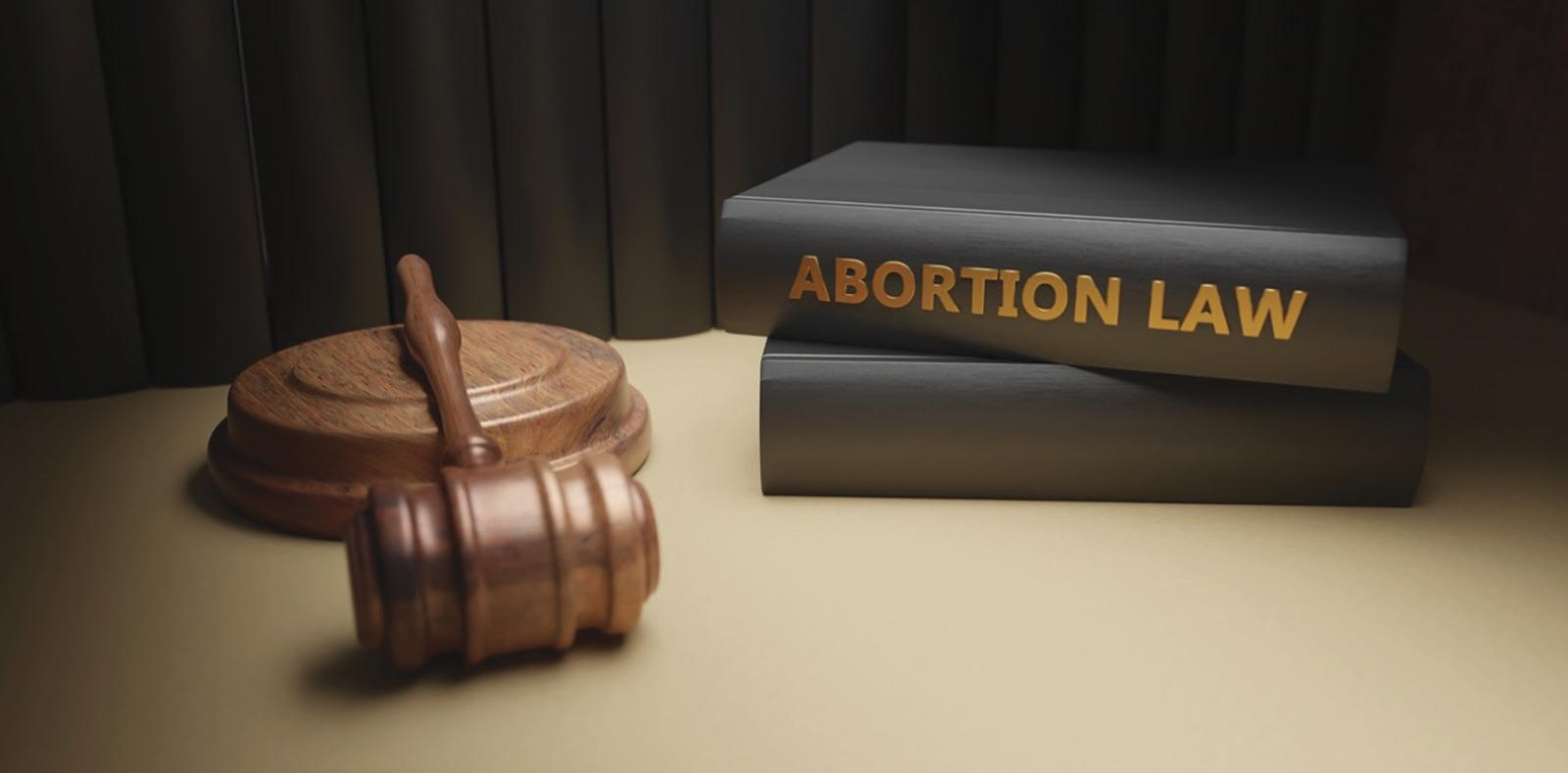
California courts have interpreted the right to privacy so that the state can only restrict abortions when needed to meet certain state interests such as public health and safety.
For example, California law requires abortion providers to be licensed.
Abortions can only be performed on a viable fetus if the pregnancy puts the health or life of the person who is pregnant at risk. Under state law, a fetus is considered viable if the fetus likely would be able to survive outside the uterus.
Failure to expand Constitutional language could shift the grounds for physicians to deny reproductive freedom affecting Black Women, some experts say.
Monica McLemore, an associate professor at the
University of California San Francisco School of Nursing, told Bloomberg.com about the distrust and negative experiences Black Women have when it comes to medical professionals.
“The health system we have in the US isn’t functioning well for Black and brown communities. But it’s a more nuanced discussion; there are a whole lot of other things that can go wrong than just death,” she said.
“When we talk about maternal mortality, we aren’t even talking about the 50,000 near misses, [the women of all races who had] serious pregnancy-related complications, like a hemorrhage, an infection, a C-section wound coming apart,” McLemore continued. “We’re not talking
about people like Serena Williams and Beyonce who live but had trauma. Black women are less likely to be believed by their health-care providers, and they are undertreated and under-diagnosed.”
Opponents of Prop 1 believe that it is unnecessary and written so broadly that it could face years of protracted court battles to clear up the language, costing the state millions of dollars in legal fees. They raise particular concern that the measure would override state regulations that now limit abortions after the point when a fetus is viable on its own outside of the womb, at about 24 weeks of pregnancy. These late-term abortions are currently only legal if the health or life of the mother is threatened.
Catherine Hadro, Media Relations Director for the No on Proposition 1 Campaign, spoke with California Black Media about the cost that could come from Prop 1.
“Everyone knows that abortion is and will remain legal in the state of California. The California Legislature has already set aside $220 million to expand abortion access in the state of California. $20 million of that is specifically to pay for women coming from out of state into California to get abortions. The California Legislature has said they expect it’s going to cost an additional $100 million dollars within the next 5 years to pay for women coming into California for abortion. This is only going to increase and cost California taxpayers even more if abortion is legalized up till the point of birth … This is just another example of politicians throwing money at another problem that does not exist.”
Gov. Gavin Newsom has begun airing ads supporting Prop 1 using least $2 million of his own campaign funds to pay for them.
“Fundamental freedoms are vanishing. Women are under attack. This November, we say NOT here. Prop 1 will enshrine reproductive rights in the CA constitution,” Newsom says in the ad.
Prop 1 is on the November 8th General Election Ballot.
Safety Tips for Drivers and Pedestrians
Ahead of Halloween Celebrations


ELK GROVE, Calif. — October is best known for its Halloween festivities, but it is also National Pedestrian Safety Month, which ties in perfectly with the need for pedestrians and drivers to be extra careful and watch for increased foot traffic on the streets. This month, the Office of Traffic Safety (OTS) and Caltrans are encouraging people to do their part to help reduce pedestrian injuries and fatalities.
The streets are becoming more deadly for pedestrians, with an alarming increase in the number of people being struck and killed while walking. During the pandemic in 2020, 6,516 pedestrians were killed throughout the U.S., including 986 in California. The same year, pedestrian deaths accounted for 17 percent of all traffic fatalities and 2 percent of all people injured in traffic crashes.
According to a 2022 report by Smart Growth America, people of color, particularly Black and Native American pedestrians, are more likely to die while walking than any other race or ethnic group. Older adults and people walking in low-income neighborhoods were also killed at much higher rates than other populations in 2020 as with past years. Traditionally, these neighborhoods have fewer sidewalks and parks, as well as more roads without controlled access that can carry large volumes of local traffic at generally high speeds. These factors support the need for a heightened focus on road safety for residents who rely on walking or public transportation.
Safety is a two-way street. Drivers and pedestrians must share the road, share the responsibility and work together to demonstrate safe behaviors on the road, helping to protect themselves and those around them. OTS and Caltrans offer the following tips for pedestrians and drivers to keep each other safe, particularly as Halloween approaches
Safety tips for pedestrians:
Make yourself visible: wear bright colored clothes and carry a flashlight if you are walking at night.
Avoid dangerous behaviors: always walk on the sidewalk (don’t cross mid-block), stay sober and make eye contact with drivers – don’t assume the driver can see you.
Stay off your phone: talking and especially texting distracts you from paying attention to your surroundings.
Look before you step: cross streets at marked crosswalks/intersections, obey traffic signals and watch for turning vehicles.
To prevent stumbling or tripping, make sure that costumes don’t drag on the ground.
Look left-right-left before crossing a street.
Safety tips for drivers: Don’t speed! Obey the speed limit, never use your phone, and always be cautious of your surroundings.
Never drive under the influence of alcohol and/or drugs.
Look out for pedestrians, especially in hard-to-see conditions such as at night or in bad weather.
Pedestrians have the right of way at any crosswalk or intersection, so yield and be prepared to stop.
Stop at the crosswalk stop line to give drivers in other lanes an opportunity to see and yield to pedestrians too.
Be cautious when backing up – pedestrians, especially young children, can move into your path suddenly.
National Pedestrian Safety Month is an ideal time to shine a light on the importance of prioritizing safer behaviors on the road to protect our children, parents, grandparents, siblings, friends, and co-workers.
To learn more about ways to stay safe, visit www. gosafelyca.org.
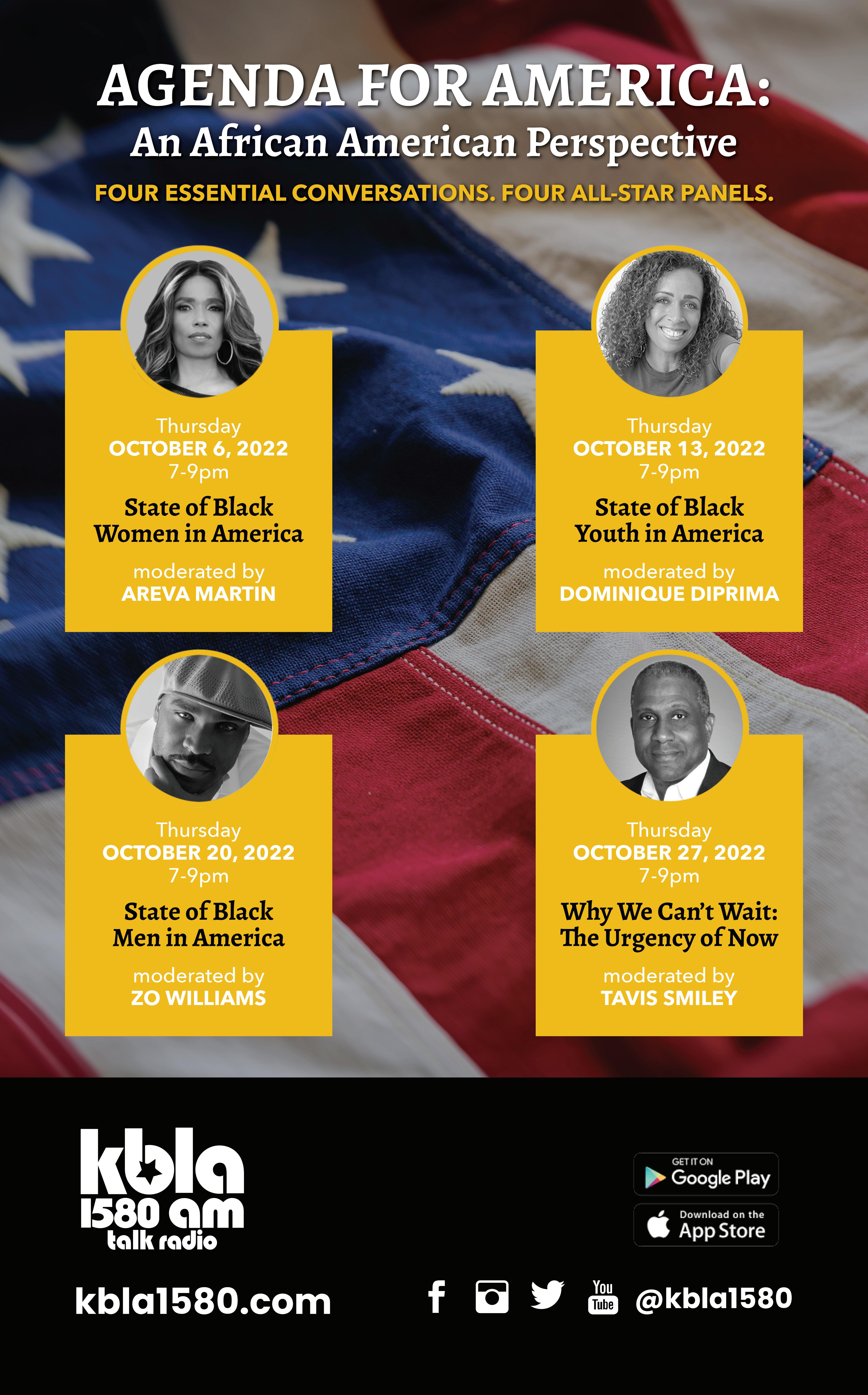
California Roll Call
By Earl Heath Contributing Sports WriterThere have been several football players that played Prep and College football in California. This is hoe some of them faired this past weekend at schools around the Na tion.
Jayden Daniels (CaJon High) in San Bernadino com pleted 21 of 28 passes for 248 yards and two touchdowns in a 45-20 comeback win against Ole Miss (7-1, 3-1). The 6-3,200 pounder also ran for 121 yards and three TD’s on

the ground. His efforts made him the first quarterback in LSU history to rush for 100 yards and pass for 200 yards in same game twice in a single season. All that earned him SEC “Offensive Player of The Week.”

CJ Stroud (Rancho Cucamonga High) completed 20 of 30 passes for 286 yards and 4 TD’s to help lead Ohio State to a 54-10 win over Iowa. The 6-3 218-pound Jr. has competed 133 of 190 passes for 2038 yards and 28 touch downs with only 4 interceptions. The Buckeyes (7-0, 4-0) are in 1st place in the BIG-10 East.
Bryce Young (Mater Dei) completed 21 of 35 passes for 2 touchdowns in leading Alabama to a 30-6 win over Miss. State (5-3, 2-3). The current Heisman Trophy win ner has thrown for 1,906 yards with 18 touchdowns, only 3 interceptions this year while leading the Tide (7-1, 4-1) to first place in SEC East. It was his second game back since a shoulder injury sidelined him. Bru McCoy (Mater Dei) is second on the team with 24 receptions for 397 yards a 16.7 average per catch.
Historic Crew Announced
By Earl Heath Contributing Sports Writer
It was announced a historic game assignment for our Los Angeles Football Officials Association members.
The following members have been chosen to officiate the first Los Angeles City Section Varsity football game that will feature an all-female crew. They include Crys tal Nichols – Referee, LaQuica Hawkins – Umpire, Zina Jones – Line Judge, Kim Bly – Head Lines-woman and Connie Wells – Back Judge.
“It’s about time,” said Crystal Nichols. She will be the referee for the game. “It’s my 31st season of working foot ball. I was first woman to officiate international men’s & women’s at the highest level in in Finland.”
The game is scheduled for Friday, October 28th at Marquez High School in Los Angeles with a @ 7:30 pm kick-off.
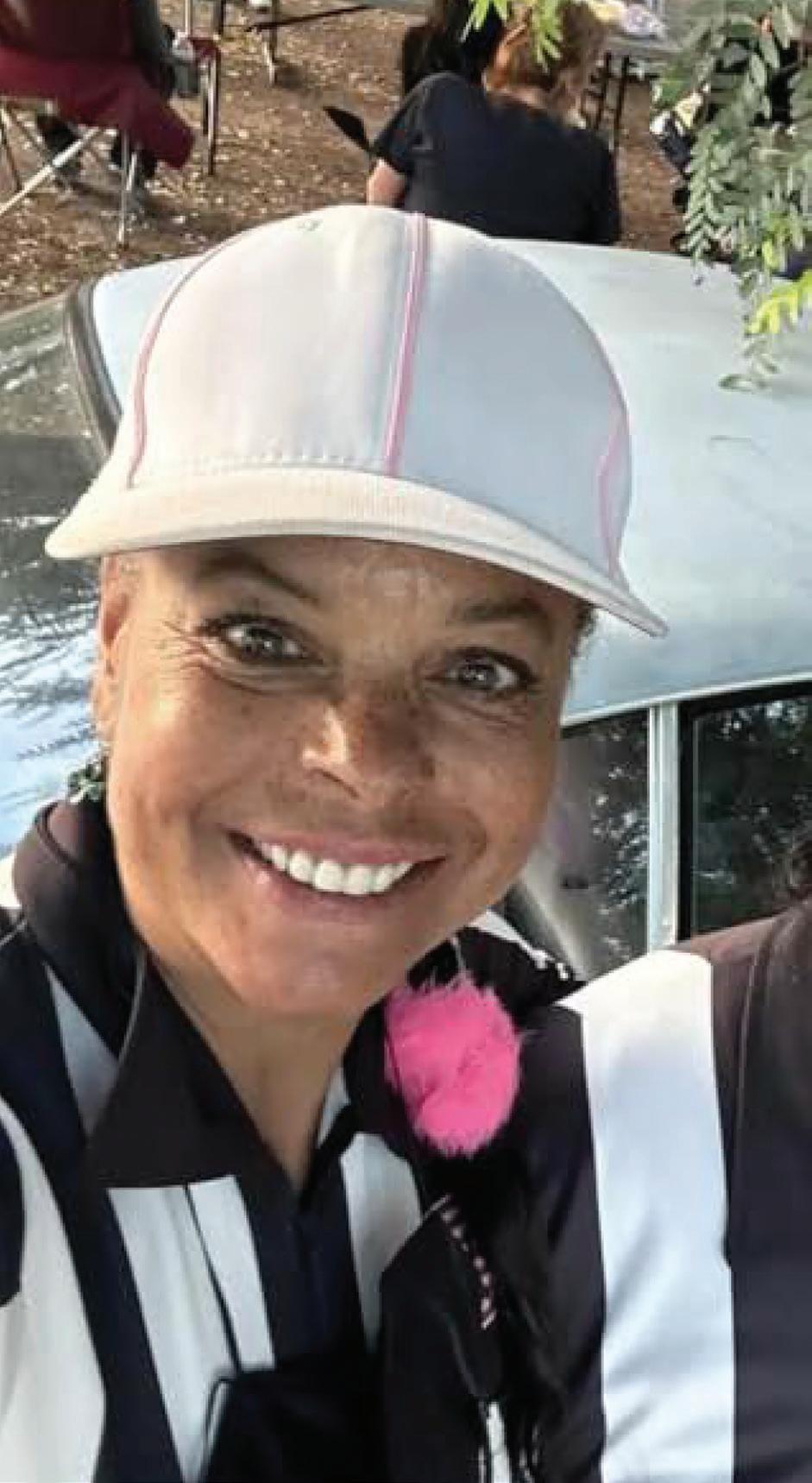
Warriors Who Wear Pink
Rhyan Nile Feature Writer1 in 8 U.S. women will develop invasive breast cancer over the course of her lifetime. In 2022, an estimated 287,850 new cases of invasive breast cancer are expected to be diagnosed in women in the U.S. Breast cancer is always caused by a genetic abnormality, 85-90% of breast cancers are due to genetic abnormality that happens as a result of the aging process and the “wear and tear” of life in general. Women everywhere are fighting this battle and even a few men, and need our help. “Cancer doesn’t care, so you have to,” said Crystal Brown-Tatum. Let’s change “you” to “we”. So WE have to.
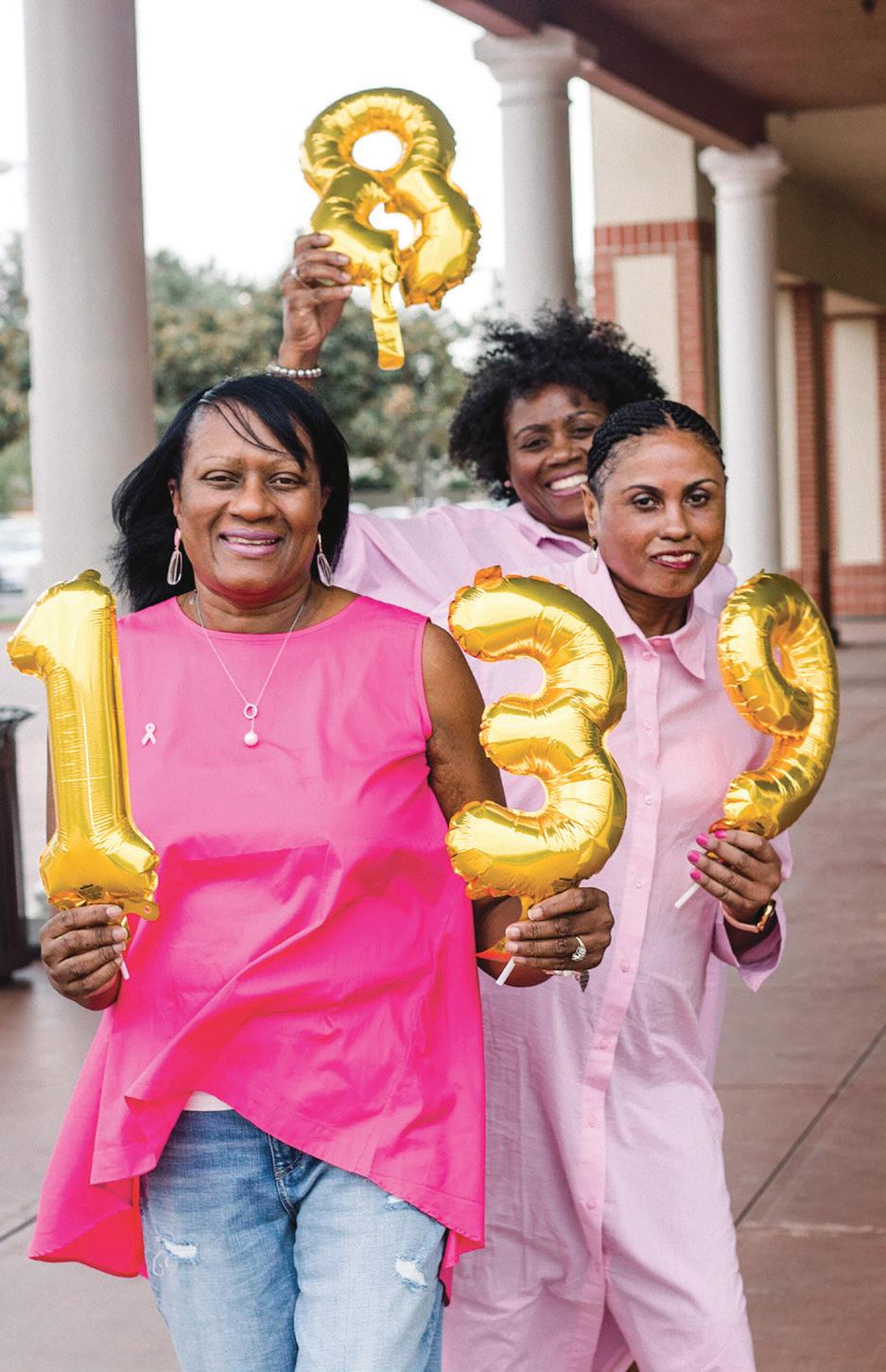
Breast cancer awareness in the African American women and community where 40% of black women are more likely to die from breast cancer than caucasian women. Sisters of women diagnosed with breast cancer have a lifetime increased risk of disease and researchers found that nearly 6.5 times higher than the average risk of breast cancer. Phyllis Luckey is a breast cancer survivor along with her four sisters. They have lost friends and family to breast cancer. Phyllis is a member of Links for Life. Before the pandemic, Links for Life would have fundraising events and she would support by purchasing tickets and is always sharing her journey. She participates in walks for breast cancer and wears pink all month. Phyllis is also pictured in this month’s issue of Bakersfield Life magazine for the month of October as a 14year survivor. Phyllis and her sisters have to do self-breast exams and get yearly mammograms. “Don’t be afraid early detection can save lives. Men should also do self-breast exams” said Phyllis.
Yolanda Prichett is one of the four sisters of Phyllis Luckey and together they all work together, all year long to tell their survivor stories and hopefully, educate as many people as they can to help the cause. Through technology, they upload videos and talk with each other about how breast cancer affected each one of them in different ways. “By us being so open with our experience, a lot of women have let us know how our bravery, and strength to share our stories has touched many lives. This is how I choose to
support the cause in the best way, by being open with my journey” said Yolanda.
“Get Your Mammograms!! Don’t overlook breast pain, bumps, or lumps in the breast, talk to your doctor, and please know that with early detection, science, and God—millions of women are survivors of breast cancer” said Darlene Williams, the third sister. Darlene is also a part of Links for Life, and invites them to her church to educate and inform the congregation on breast cancer awareness. Darlene has looked at her past diagnosis as not a death sentence, but instead a life sentence. She consistently encourages and preaches positive affirmations, alongside her sisters, to the patients and survivors of this disease.
“Fight like girls, but win like girls too”, said Darlene.
Technology is getting stronger, we’re becoming more aware, and there are things we can practice at home to help as well. First, know your family history and GET YOUR MAMMOGRAMS!! These two things are vital because knowing early is way better than knowing too late. Keep weight in check, eat healthily, and be active. A healthy body is essential. Limit smoking and extra hormone pills, such as birth control after the age of 35. Phyllis and Yolanda make it a point to always talk about the importance of breast cancer awareness. Research new clinical trial medication. Sharing videos, talking to other women about the experience you’re having, and ensuring them how important they are. PROMOTE, ADVOCATE, AND SHARE. It is our best armor to protect us from the enemy of breast cancer.
Black Women’s Vote Will Impact California
Protecting reproductive health means hitting the ballot boxes on November 8th
By: Kara James, Los Angeles Nurse Practitioner Planned ParenthoodOn Friday, May 2nd, 2022, I had just returned to Los Angeles from a girl’s trip to Colombia with my two daughters in their twenties. As wonderful as our vacation was, we were all glad to be home, but we immediately noticed the vibe wasn’t right.
As we walked, tweets from Black Twitter began endlessly buzzing notifications. Emails with subject lines mentioning in some form or another that “women’s rights are gone.” All thoughts of a warm welcome home ended abruptly. As my daughters and I looked at each other, we knew a war for our bodies had begun.
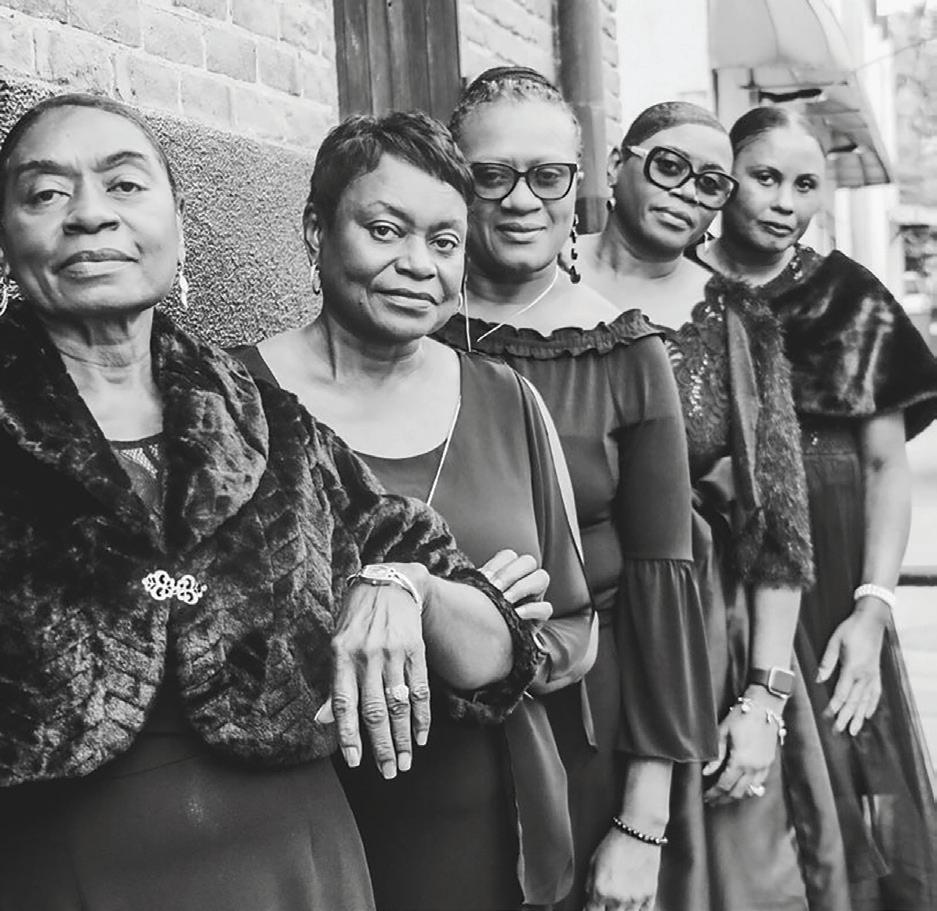
That Friday morning was the day the United States Supreme Court leaked the draft opinion that would overturn Roe v. Wade, crippling reproductive freedom across the nation. In short, the full range of reproductive services that organizations like Planned Parenthood Los Angeles (PPLA) provide, including prenatal care, contraception, cancer screening, and STD treatment, were all under attack.
As a Nurse Practitioner for Planned Parenthood Los Angeles Black Health Initiative, I see how these decisions impact our bodies and futures. Every day I provide patients with the care they need to ensure that women are empowered with the freedom to make their own choices concerning their futures and reproductive health. We must drastically change healthcare in the Black community, particularly to address Black women’s reproductive health.
I often hear my brothas and sistas in our communities saying, “We have no say,” “Voting doesn’t make a difference,” or “My vote doesn’t count.” I’m letting Black women AND men know today that our vote counts more than ever, especially at the local level. According to the Center for American Progress, Black women are among the largest and most consistently engaged demographic
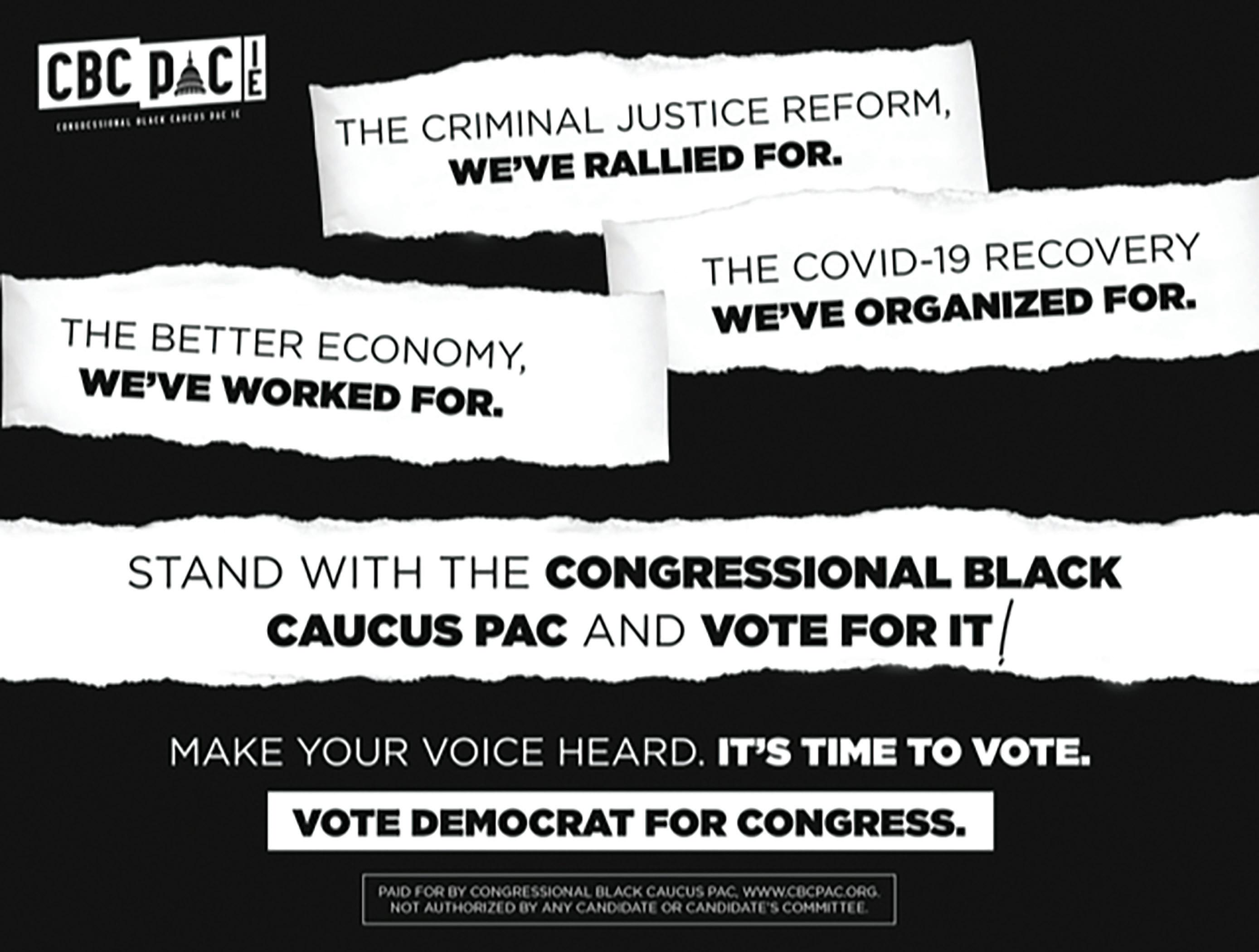
groups in American politics nationwide. The overturning of Roe vs. Wade has only generated more energy among female voters, especially in California.
CalMatters.org reports that the number of female lawmakers could rise above California’s current record of holding 39 of 120 seats. This is an opportunity to ensure that Black women use our influence to empower legislators to make laws that protect all women in California. So not only do we have a say in California state laws, but our votes also influence how these laws are enforced because we are voting for mayors, police chiefs, and district attorneys.
The bottom line is that we know Black women and other women of color have consistently faced overwhelming financial, institutional, and social obstacles in obtaining reproductive healthcare. This year’s Supreme Court rulings have led to restrictive reproductive health laws in many states criminalizing pregnancies by people of color.
We have to advocate for our bodies, our choices, and the protection of our sisters’ and daughters’ choices to plan the lives they will lead. The only way to ensure these rights is to wake up early, amplify our voices through social media, and make November 8th a family event by showing up to vote.
So, my question to you is, what will you be doing on November 8, 2022? Let me tell you what my daughters and I won’t be doing. We won’t be missing our opportunity to cement a fundamental right to reproductive freedom and the right to choose or refuse contraceptives in California, which Proposition 1 protects.
To learn more about Prop 1 and other important California Propositions, please visit https://calmatters.org/ california-voter-guide-2022/propositions/
To register to vote or check your registration status, visit https://registertovote.ca.gov/
